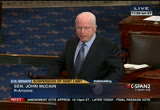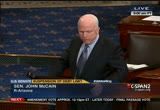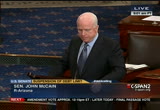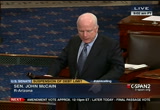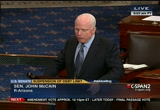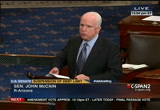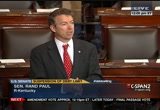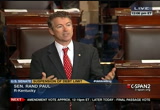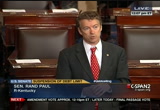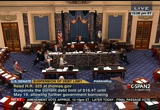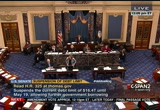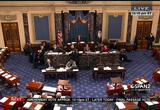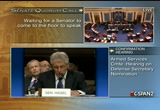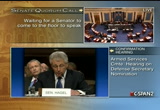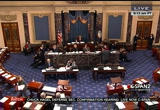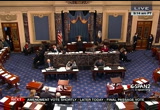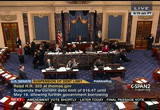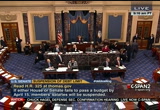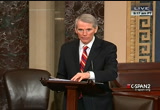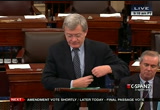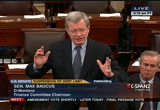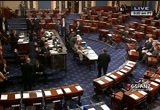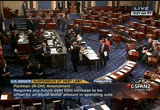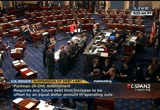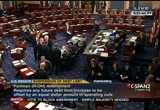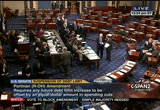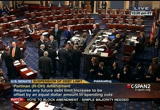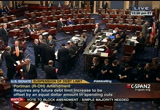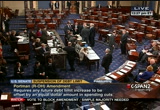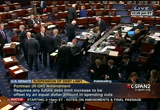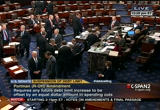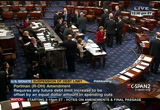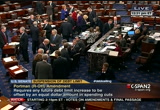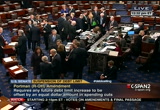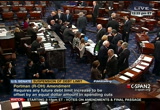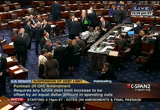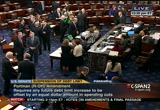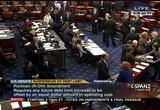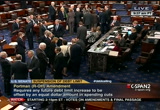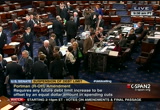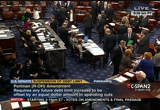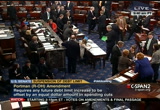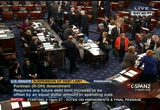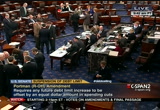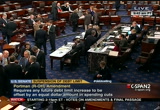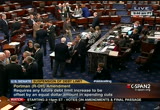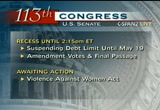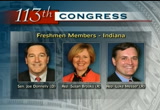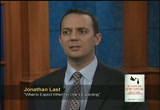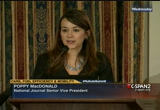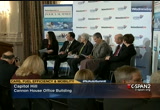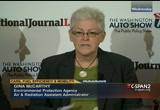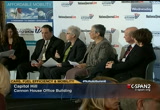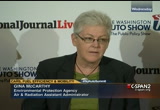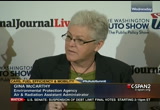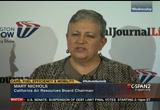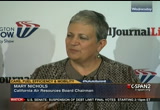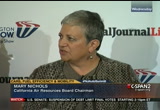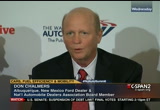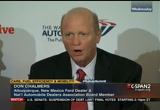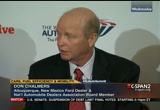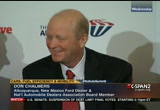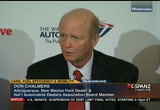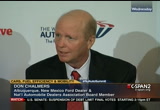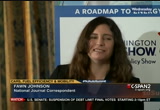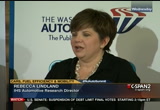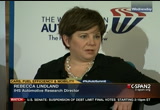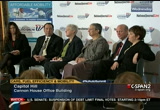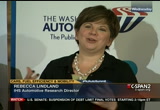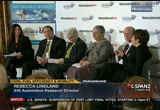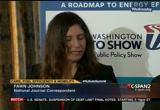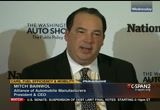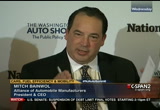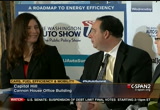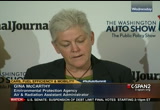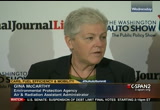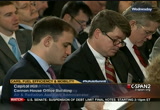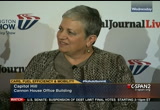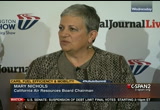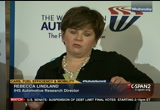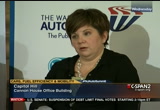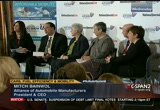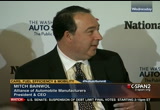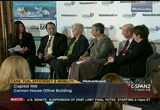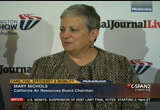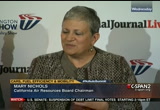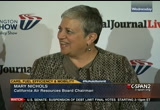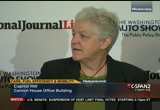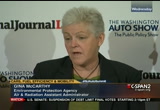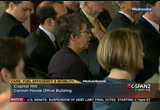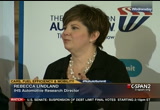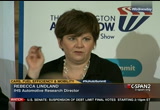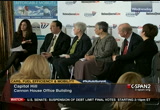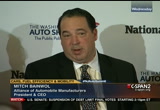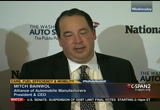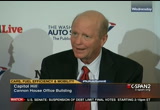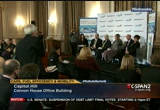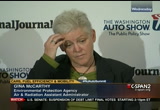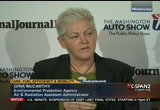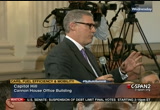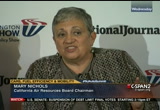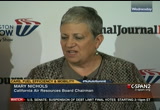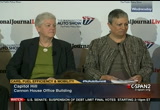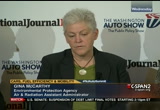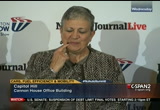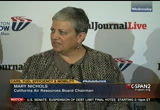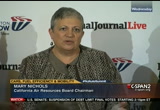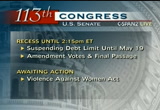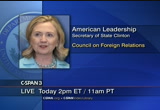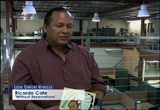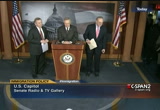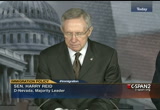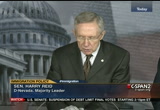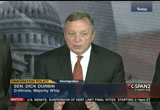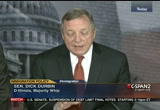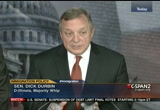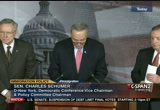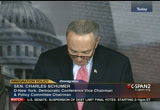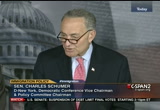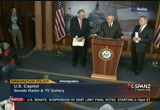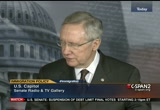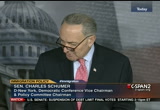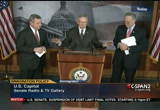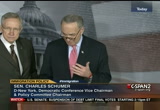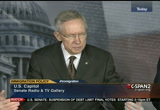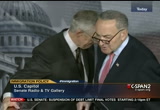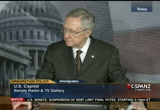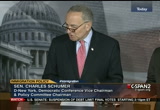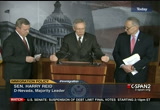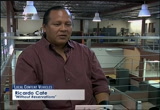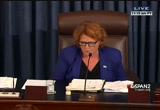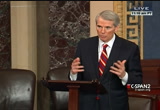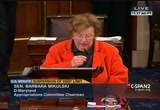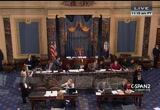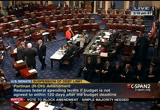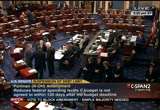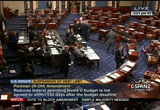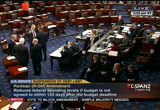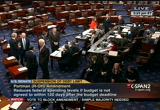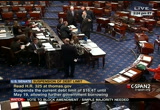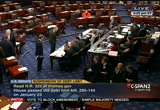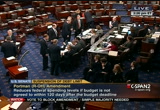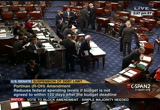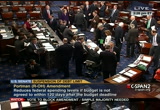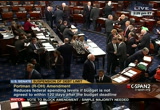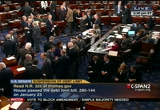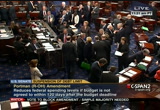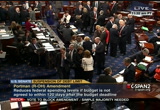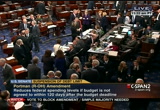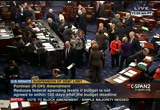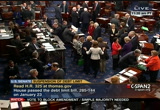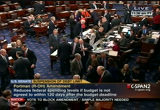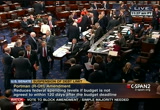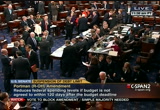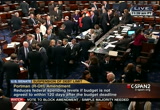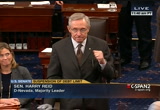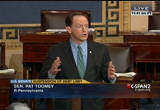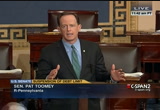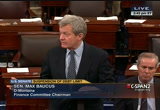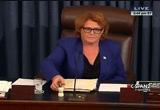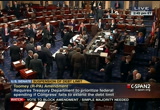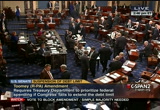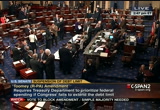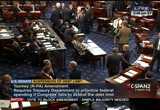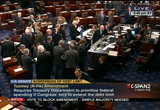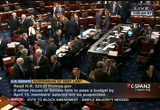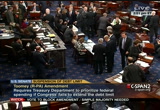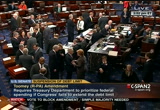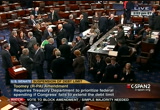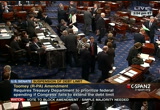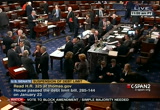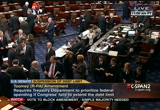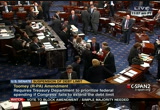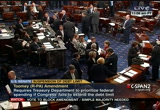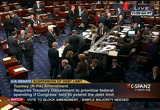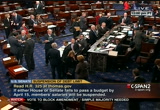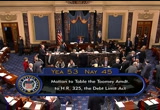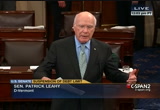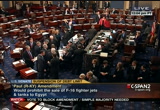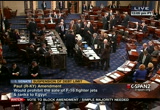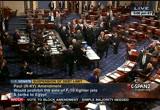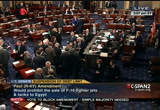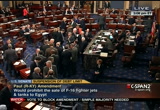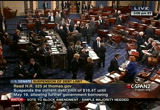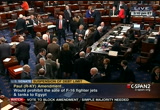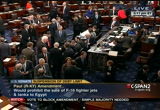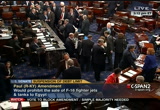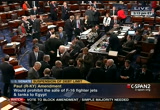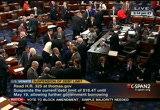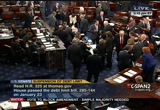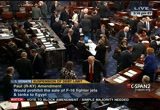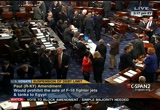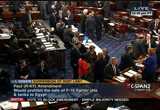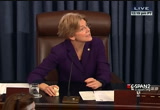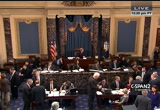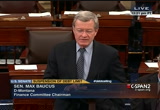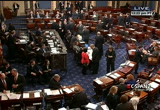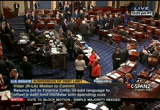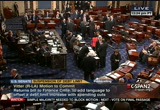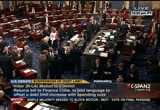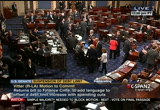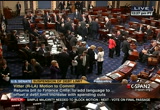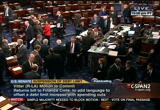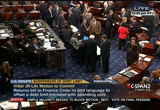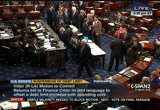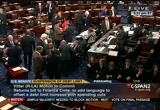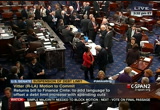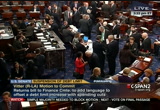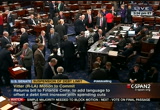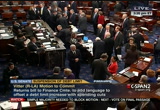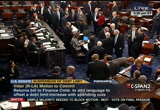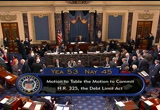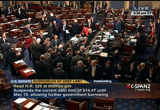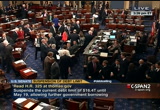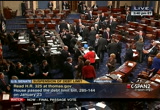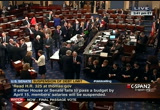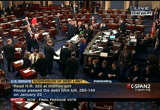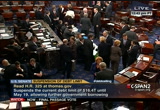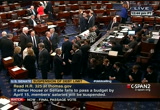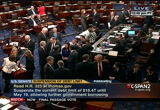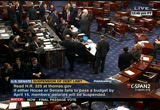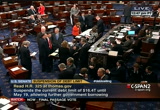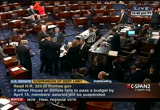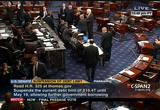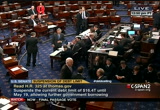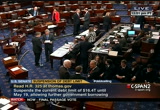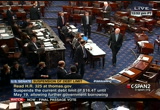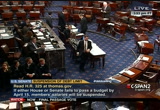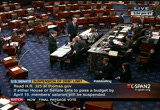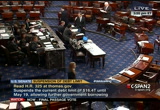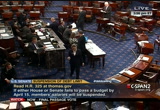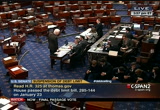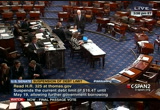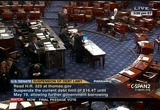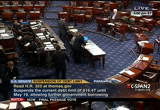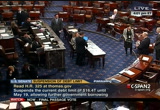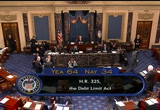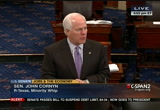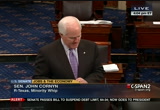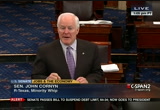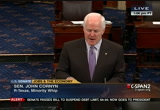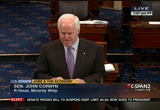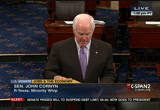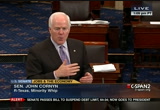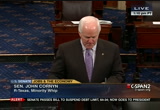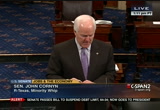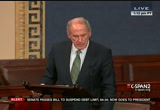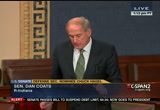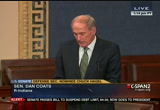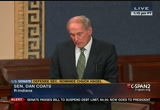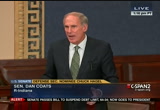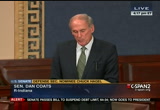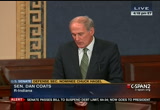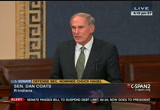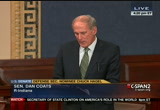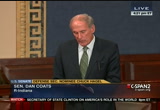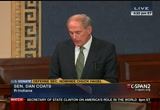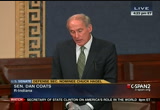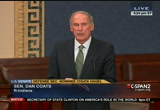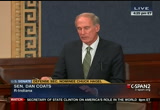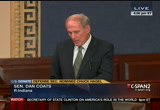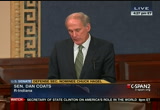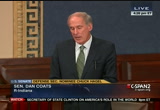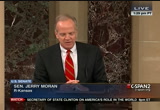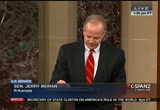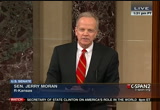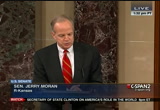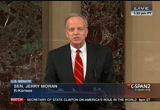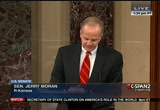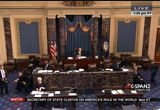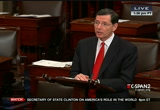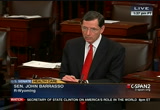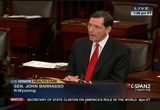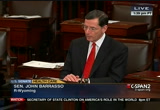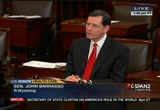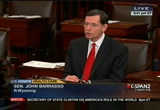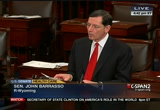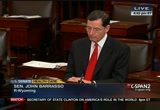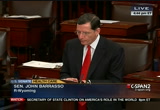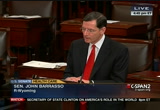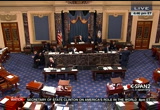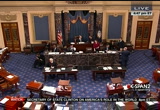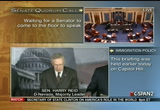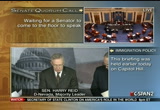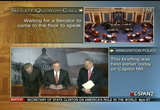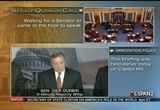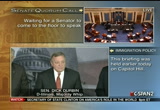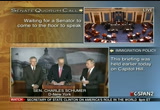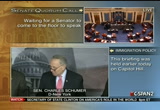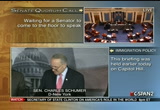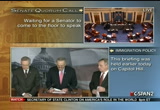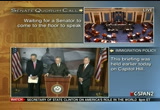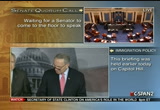tv U.S. Senate CSPAN January 31, 2013 12:00pm-5:00pm EST
12:00 pm
the fact is despite its flaws, the egyptian army remains one of the major stabilizing forces in egypt today. if god forbid the current unrest worsens and egypt tips deeper into civil conflict, the one force in that country that might be capable of pulling egypt back from the abyss is the egyptian military. if the senate were to adopt the amendment proposed by the senator from kentucky, we would not only be harming the effectiveness of the egyptian military -- which, by the way, is not objected to by the israelis who probably understand better than anyone what defense capabilities might be used someday to threaten their security -- we would be rupturing a decades-long partnership and denying our -- and squandering our influence with the leaders of one of the most important institutions in
12:01 pm
egypt. the ramifications of this decision would be enormous, especially when it comes to the ability of u.s. ships, including u.s. aircraft carriers and other vessels, to transit the suez canal securely and effectively. i would urge the senator from kentucky to call the chairman of the joint chiefs of staff and ask him what effect this would have on the u.s. military and america's overall national security. as i say, this amendment would be even more detrimental to our ally, israel, for which the continuing instability in egypt is an abiding clear and present danger. i have seen no objections raised by our israeli allies to u.s. military assistance to egypt, nor do i expect to see any. here, too, i would urge my colleague to pick up the phone and call the israeli ambassador or just recall what i'm sure he heard from israel's leaders during his recent visit there a few weeks ago. this amendment is absolutely
12:02 pm
harmful to the national security of our ally, israel. the timing of the amendment is also detrimental because our government is currently engaged in discussions with the egyptian government and military about the need to shift our security cooperation more towards the kinds of programs and equipment that egypt needs to combat the threats they increasingly face: porous borders, a rising threat from terrorism, deteriorating conditions in the sinai, and a security sector in dire need of reform. mr. mccain: it is in egypt's interest to move in this direction, as they are beginning to do, and it is in our interest to help them. if we adopt this amendment, the promise of this entire endeavor will be destroyed and egypt will suffer, israel will suffer, and the united states will suffer. i pose this amendment because it is uninformed and oblivious to the real-world challenges america faces and our continuing
12:03 pm
need to work effectively with partners in perfect and frustrating -- imperfect and frustrating though they may be, to defend our nation, our interests and our allies in an increasingly dangerous world. finally, madam president, the middle east is in a period of transition and change that we have not seen practically in its entire history. the egyptians are key and vital to what happens in that part of the world. it is the heart and soul and center of the arab world. one out of every four arabs that live in the arab world live in egypt. it is the cultural and historic center of all of the arab world. it is vital that we do whatever we can to see that egypt makes a transition to a free, democratic
12:04 pm
and open society. that is in grave danger today. to pass this amendment today and send this message to egypt in this very, very, very unstable and unsure time i believe would be exactly the wrong message at this time. i would also point out that this legislation has nothing to do with egypt. has nothing to do with egypt. a decision of this magnitude in my view requires hearings, debate, and legislation that would stand by itself rather than in a 15- or 20-minute discussion here on the floor of the senate. for that reason alone, i urge my colleagues to overwhelmingly, as we have other amendments of the senator from kentucky, overwhelmingly reject this amendment. i yield the floor.
12:05 pm
mr. paul: madam president? the presiding officer: the senator from kentucky. mr. paul: i ask unanimous consent to speak for five minutes. the presiding officer: without objection. mr. paul: i find the argument spurious and really, frankly, absurd that not giving f-16's to egypt is somehow against the interest of israel. imagine this -- the president of egypt has called jews bloodsuckers and descendants of aprils and pigs. -- of apess ans and pigs. the president of egypt has also said that when we look at the relationship of israel and her supporters, he said -- stood next to a cleric and chanted "amen," and said amen that we should go after and destroy israel and the -- and the supporters of israel. so somehow it's a good idea to ship weapons to this country and to this religious zealot?
12:06 pm
i find that absurd that that would be in israel's southwest t interests. now, somehow the argument is made that, oh, this will lead to stability in egypt. well, giving f-16's is somehow going to stabilize unrest in egypt? it makes no sense whatsoever. so i would say that when we look at this and we hear arguments such as, "well, this will cost money," well, you know whose money it was that bought these f-16's? it was our money to begin with. we send the money to egypt and then they buy the weapons from us. if we're worried about a flies store the -- about a place to store the f-16's? why don't we give them to our military. everybody seems to be saying it's a problem, this sequester, and there's not enough money for our military. why don't we give the 20 f-16's to our military? why don't we give the tanks to our military? apparently this is more tanks that are being given to egypt that often different contingents of our marines have at any given point in time. so i would say keep the money
12:07 pm
and keep the weapons in our country. but mark my words, it's a mistake to send these weapons to egypt. it's not in israel's best interest. and for people to come down here and argue that it's in israel's best interest to send weapons to a country that professes hate, professes a disbelief in the holocaust, that professes that they are in favor of destroying israel. that's who we're supposed to send these weapons to? it makes no sense at all. and our foreign policy often makes no sense at all. and so i think we do need to reassess. we made this deal with mubarak. we didn't make this deal with morrissey. currently egypt is unraveling. i think it's a terrible mistake to send these weapons to egypt, and i hope my colleagues will consider that. thank you, madam president. i yield back high time and -- i yield back my time and suggest the absence of a quorum. the presiding officer: the clerk
12:17 pm
a senator: mr. president, i ask unanimous consent that the quorum call be dispensed with. the presiding officer: without objection. under the previous order, there will be two minutes of debate equally divided prior to a vote in relation to amendment number 6 offered by the senator from ohio, mr. portman. the senator from ohio. mr. portman: thank you, madam president. we had a good debate earlier on this. this is the dollar-for-dollar deficit-reduction act. it makes all the sense in the world. we have a $16 trillion national debt now exceeding $130,000 per household in america. we're told by the congressional budget office there's $9 trillion more coming over the next decade. we've got to make this difference here on this bill. we've got to take this opportunity to ensure that we are in fact beginning to reduce spending, getting this under control as we once again are asked to extend the debt limit. this would not apply to this particular short-term debt limit, by the way. this would set up the discipline for the next debt limit which is
12:18 pm
anywhere from three to six months from now, adequate time to come together as republicans and democrats and determine how we indeed reform the entitlement programs, put tax reform in place, go through regular order in the finance committee as the chairman and others called for, to ensure we can get this under control. it's a commonsense proposal. we did it two years ago. most democrats and most republicans here on the floor supported it in the past. democrats in the house have also supported it, about 95 of them. it's a dollar-for-dollar reduction over ten years as we raise the debt limit. for folks who are wondering today -- the presiding officer: the senator's time has expired. mr. portman: thank you, madam chair. a senator: madam president? the presiding officer: the senator from montana. mr. baucus: madam president, january 23, i think it was a wednesday, something marvelous happened. what was that? the house, on a strong bipartisan basis, passed a bill which would raise the debt
12:19 pm
limit, extend the debt limit to may 18. bipartisan. speaker boehner is to be commended. this town is criticized for its lack of working together, it's too partisan. speaker boehner found a solution to help us relieve the pressure so we could get our job done in getting deficit spending under control. the method suggested by the senator from ohio is a step backwards. we tried that. we tried it a couple of years ago. it didn't work. you will all remember the august 11 basic collapse with the markets, where the credit agencies began to downgrade our debt. so i say let's follow the lead of the bipartisan speaker, who found a way -- took great leadership to get us to pass a provision here. we should pass the same provision, because if we don't -- if we don't -- then we're back to chaos. the presiding officer: the senator's time has expired. mr. baucus: -- many in the
12:20 pm
provision has to go back in the house. you think the lack of confidence today -- just think of the lack of confidence that would prevail -- the presiding officer: the senator's time has expired. mr. baucus: i thank the chairman. madam president, i move to table the portman amendment and ask for the yeas and nays. the presiding officer: is there a sufficient second? a senator: second. the presiding officer: there appears to be. the question is on the motion to table. the clerk will call the roll. vote:
12:45 pm
12:46 pm
>> there are three new members of the indiana delegation serving in the 113th congress. joe donnelly replaces republican dick lugar who lost in the republican primary. mr. dodd is an attorney, small business owner and formally served in the u.s. house. two new house members, republican susan brooks is a former u.s. attorney for the southern district of indiana. she takes the seat of fellow republican dan burton who retired after 15 terms. and republican luke messer, formally a member of the state house and headed indiana's republican party. >> she loved being first lady. she had the job less than a
12:47 pm
year, but she ordered the marine band to play "hail to the chief" whenever the president appears, a custom that we still fall. subject to more criticism it was also julia tyler who greeted her guests with purple plumes in her hair. him. >> historian who on julia tyler, who married president john tyler while he was in office after his first wife passed away. c-span's original music series, first ladies influence in image, their public and private lives, interests and their influence on the president reduced with the white house historical association. season one begins presidents' day february 18 at 9 p.m. eastern and pacific on c-span, c-span radio and c-span.org. >> from almost the founding you
12:48 pm
would see the fertility rates decline. and by the time we hit the second world war we were right around 2.1, 2.2. van after the first world war, the second world war, sorry, we had the only major instance of fertility rate, that's the baby boom. that's the term which hates us. it really was a remarkable mode because not only the fertility rate quite high, as high as 3.7 i think for white americans and basically 3.9 for black americans to not only did it jump up and stay there for an entire generation. it was a long lasting effect. people change the way they lived for a generation. by 1970 that moment had ended. we saw not a gradual float down the road the fertility rate dropping off. >> jonathan last and how changing demographics and birth rates could cause the u.s. to
12:49 pm
lose its place as a world leader. sunday night at nine eastern on after words on c-span2. look for more booktv online and like is on facebook. >> on wednesday, senior executives from toyota, honda and chrysler expressed support for the obama administration's efforts to increase auto fuel efficiency over the next decade. the panel hosted by the "national journal" looks at the prospects for electric, natural gas and hydrogen powered vehicles. the latest epa regulations seek to regulation -- currently being reviewed by the white house. this is an hour. >> mitch bainwol, president and ceo, alliance of automobile manufacturers. don chalmers, national auto dealers association, rebecca lindland, director, automotive research, ihs automotive. gina mccarthy, assistant administrator, epa, mary
12:50 pm
nichols, chairman, california air resources board. our moderator for this panel will be fawn johnson a correspondent for "national journal." she pray praised the covered financial regulation and telecommunications for dow jones newswire and "the wall street journal." and is an alumnus. once again just a reminder to everyone in the room and viewing via live stream, we welcome your comments, your questions and your thoughts via twitter, #njautosummit. fawn, i will turn it over to you. [applause] >> i want to thank our panel for participating. [inaudible] we really appreciate you sticking around. i'm going to start the question
12:51 pm
-- thank you for being here. if you can just give us a quick update on the greenhouse vehicle standards for 2012-2016, but if you want to project out to 2025, that would be helpful as well. >> first of all, thank you for pulling this together. it's been an exciting week, and it's an opportunity for us i think to revisit what was accomplished over the past few years. let's just take a look, 2012-2016 is the first phase in the president's national program. that extends out to 2025. really during the period of time will essential double fuel economy up to 54.5 miles per gallon. it does it in a way that collaborates with the automakers themselves in a way that will produce the kind of cars that are safe and effective and perform the way that american consumers want to see. will really provide tremendous
12:52 pm
benefit. so it's a win for everyone and that i think is my basic message. if you look at on the climate change side, whether we're we ae talking about is over the course of 2012-2025, those vehicles are going to reduce their carbon pollution by 6 billion metric tons. we're talking about 12 billion barrels of oil saved. these are numbers that are not to be sneezed at, ladies and gentlemen. these are very large benefits to society. in terms of automakers can we saw the automakers standing up for the president. we saw them touting this initiative because they knew they could be producing cars that were more efficient and that consumers would want to purchase. and on the consumer side, perhaps consumers here are the biggest winners of all. they are going to get cars that again perform the way they want to better city, better life that is, that provide them with what they need. but they will be saving money and the pocketbooks every time they go and drive their vehicle.
12:53 pm
that only gets better over time, as these standards increase. so it's exciting. we're also using the same initiative on the heavy-duty truck side. we have already produced in collaboration with the industries themselves and initiative that extend from 2014 to 2018 on the heavy-duty side come and we're looking for additional savings in another rulemaking over the next few years. and again, it's collaborating with the industries themselves. but let me take one minute to look at what we are actually sing in 2012 because we are in 2013. for those of you like me forget what you we're in. what we saw last year was actually what we expected to see. we saw a lot more penetration of fuel economy technology that made gasoline engines more efficient. we saw direct injection going from five years ago it was at zero penetration, now it's at 25. we have seen more advanced
12:54 pm
transmissions but these are the kind of things that are going to make benefit for the vast majority of cars that are out there today. we actually saw two kinds of many hybrids and vehicles as we have seen over the past five years, and what we have seen is a continued penetration of plug-in electrics and all electric vehicles. the most exciting thing may be for everybody is we see six times as many cars that have a combined city and highway label rating of 30 miles per gallon or better. so in 2012, we are almost seen the kind of benefits that we might anticipate and 2016. so what we are seeing here is good old american ingenuity in the car manufactures. we are seeing them being challenged. we're seeing them step up to the plate and we're seeing them bringing consumers the kind of products that they are expecting, and that significant societal benefits for all of us. >> i had some journalistic questions before we go to to
12:55 pm
that but i want to go next to mary, because you have been collaborating closely with epa on some of california's regulations. so if you can tell us about your advanced car program for which we were granted a waiver, and other crisis. we are very proud of having played a role with u.s. cpa and department of transportation. last year's achievements of the new greenhouse gas and pollution standards, but we are also looking at this as a part of a bigger picture. also in collaboration with our federal partners, but california as is our want is trying to carve out a path which we hope is going to not just keep on producing the best cars that our industry is capable of producing, but looking at the
12:56 pm
whole of transportation system as a package year because of our legislation, ab-32, which requires california to achieve the same standards as the countries in the world signed the kyoto treaty, moving our greenhouse gas emissions as a stay back in 1990 levels, but even more so because of the challenges of meeting our requirements for health state stand. we have to look at not just the vehicles but the fuels and the systems that are using both of them in a more comprehensive way. advanced clean cars program focuses on vehicles and on the need to bring on the next generation of ultraclean vehicles using essentially electricity or hydrogen, or very advanced biofuels as their means of propulsion. but in our vision for 2030 and beyond, we are looking at reducing emissions from the
12:57 pm
fuel, getting all too low carbon fuels into the mix. and also at rolling out the infrastructure where the state plays a role as the provider or plan are working with local governments and others, so that these vehicles that we are seen now being produced are going to be a success. it's a center for the economy of our state. in california is not a state where movies or even silicon valley are our leading economic base to our economic base is actually transportation. it's logistics. it's moving things to our ports. we have whole counties where the major source of air pollution is the railyards and the truck terminals. and so making all these pieces work together so that we can truly come up with a transportation system for the future that meets our environmental and economic needs is the goal here.
12:58 pm
the federal standards, state standards that we worked on last year are really important step in that direction because they save consumers money. but we have to do more than just make the cars affordable. we have to make it affordable to operate them, and we have to make sure that when people get in them they can move around. and are not just any all the time stuck in traffic. so we're trying to work on all of those things at the same time spent that's a perfect lead in the don because my question for you about is about affordable and the impact of affordability comes from the standards of both california and epa are putting out. >> well, thank you. for those who may not know i'm an automobile dealer and am on the board of the national automobile dealers association. i have been in the retail automobile business for almost 40 years so i think i know what happens on the show room floor and how it might affect things in the real world. i would like to say to begin
12:59 pm
with that automobile dealers as a group are very, very much in favor of the improved fuel economy. nothing would be better for business than there was in an economic impact cost wise. so that's not going to happen that way. and that is our concern. automobile dealers represent north of 15% of the retail dollar sales in our country, and no the 50% of the retail employment in our country. so i think this is a very, very important segment to be included in this panel. of the concerns that i would have, being all for the fuel economy, are probably fall in one of two categories. are the consumers willing, and are the consumers able to take advantage of the technology that will be coming from the manufacturers? under are they willing, will we
1:00 pm
be able to make the standards and produce the types of cars that people want? i wish i had a crystal ball to tell you. these standards are further out than we have ever had it. we would prefer them to be in five year increments because it's easier to forecast five years out than 12 or 13 years out. but the rule is what it is. we don't know what's going to happen by 2025 in a lot of different areas, and so we don't know what the demand is going to be and what consumers are really going to need, what they want. this is a very, very diverse country. a very, very diverse needs of the consumer, and we need to address all of them. we can't address 90% of them and leave 10% of them out. and i will tell you what happened to consumers in washington, d.c. and new york
1:01 pm
city are totally different than the consumers in new mexico or the mountain states, or california. we need to consider all of them. and we need to make sure that the manufacturers of building vehicles addresses the needs for all of the consumers. so are they willing, that's a concern. the other concern is, are they able. and this is a concern that i brought up before, although there are savings to be had by better fuel economy as for operating the cars, 90% of the cars that i sell, and i sell fords, by the way, there was and advertisement that honda dealer early. anyone wants afforded -- [laughter] -- once a ford. but 90% of vehicles that i sell are financed.
1:02 pm
and without available financing, my business would not be very good. and that's the way it is now and that's the way it looks like it will be into the foreseeable future. and although you save money on fuel economy, if we can reach and i'm sure the manufacturers can reach the standard, that doesn't guarantee that people will be able to get financed. at the low end of the new vehicle market, people, the finance compass look at what your disposable income is and look at the payments that you are going to assume when you sign a note to buy a car. these are the numbers a look at. they don't ask what the fuel economy is and how much money you're going to save. and very frankly, i don't anyone is questioning the way they underwrite automobile papers because very frankly, through
1:03 pm
the great recession that we're climate out of at this point, automobile paper has really performed better than almost anything that i know of. and, therefore, their underwriting standards seem to be right on. and they are not going to change that, at least the people i talk to, the large banks that i've been able to talk of actually said no, we don't look at it that way. and i have said this before, you'll have to excuse my back or go but it does make a difference if things are a nickel a bushel. if you don't have a nickel you don't get to buy anything. so if it's a good deal because you save money over time, but you can't get financed because you don't get approved on financing because you and come is low, then you'll not be able to take advantage of the high technology and the improved fuel economy. that's a concern. and enemy vehicles does that take out of an annual market is another concern, and it's
1:04 pm
certainly cannot help with car sales or the fuel economy, the jalopy affect so-called could come into effect where people say i can't get financed, i think i'll just hold onto my older car that really doesn't get as good fuel economy. >> what you're saying is in addition to the transportation department and epa, we need to add the treasury department into these negotiations. >> well, i hope that we don't start dictating to the finances how to finance. they been very, very successful. >> you bring up a great point about how the consumer is, from the front lines, approaching these particular issues and financing is a big deal. but that is a perfectly lead-in, rebecca, on the far end, who has done a lot of work i believe on exactly what consumers want and just looking into the future. so can you project for us what we are looking at and the kinds
1:05 pm
of questions that manufacturers should be asking as they are moving towards, not just 2016, but 2025? >> we forecast out. i'm in a unique position, different than it was last year in that i am now serving on two national academies of science committees. one is the midterm review and the other one is a barrier to electric vehicle penetration. and i was complaining about the mandates and what washington does to the industry for so long but now i am part of the project so it's a very unique position and i'm really excited to be serving on the committee. because we get the opportunity to look at these different problems and situations. and when i think about the consumer, it's really, a key element for me is avoiding unintended consequences. and as don mentioned, we could
1:06 pm
potentially delay the greening of the fleet, which is kind of in my mind the worst possible outcome. if we don't make these vehicles more affordable. and some information that i just got it yesterday, and honestly i'm trying to fully integrate into my brain and i didn't bring notes -- i didn't know we could. so when we look at the average income, at bold or of lease buyer, it's about $150,000 a year, and we look at the average buyer of the industry, it's about $68,000 a year. having worked at the fdic, worked at mercedes-benz credit, i have a background in looking at affordability, and these issues that people face. looking at loan-to-value ratio's. it's not romantic. it's not sexy, but when you go to buy that car and they say, look, you're loan-to-value isn't
1:07 pm
working, you can't afford this car. suddenly you are stuck with a 10 year-old suv that is getting 12 miles per gallon, and that's delaying the greening of the fleet which none of us what. so i think that there is certainly an element to making vehicles affordable. what i see is that people going in and saying, and and she fits my lifestyle, or crossover, but i want a fuel efficient version of that vehicle. we are still -- lasher was your hybrid sales were about 6.7% of we got up to 3.2% now. more than half of that is toyota, previous and their expanded line do. kudos to toyota but we've got to get consumers to understand that brands like ford have hybrid vehicles. the chevrolet -- sorry, the buick regal and buick enclave -- i'm sorry. buick has a pair of vehicles with the assist.
1:08 pm
you get better fuel economy than the non-ess version but it's also about the same price. so we're selling about 20% of them. why? because people perceive that as a risk. people right now are very risk averse but they don't know what this new technology is. they don't know what e-assist means. what is that? it takes a long time to explain to them when they're sitting in the dealership. there's a lot of core dating that needs to go on to educate consumers on what these different technologies are. i got the opportunity to do a porsche 9/11 which was a good day at the office. i'm sitting there and i had come if i can get it i use a manual transmission at any and all opportunity. i had one of the rarest -- it was a manual transmission car driving this vehicle and i'm in the automatic version, and it's got dual clutch transmission and it's a really sexy automatic and i'm thinking, man, all right, i
1:09 pm
will try to pick it was fantastic, and i'm horrified to say that because i'm just a manual gear head a person can but i actually enjoy driving it more than the manual, and my colleague and i were just both a little horrified at ourselves. but i say that because you've got to get people in the vehicles and got to give people the opportunities to drive these new kinds of transmissions. these new kinds of technologies that we are mandating come that we're encouraging and where automakers have to come out with these to improve the fuel economy. and it's just a matter of education and eating people exposed to these vehicles. we've talked about on some of these committees that i can't tell you what we specifically talk about in private, but having some collaboration amongst the automakers. we talked about this before we came up. they are all facing the same issues. everyone has the same fuel economy standards to meet. they are all in different stages of meeting them, but the
1:10 pm
challenges are all the same. and so collaborating on this kind of work i think is really, really valuable. getting consumers to exposed to these cu god-given technologies, and teaching them how they can save. the problem is that it's hard to tell somebody you're going to be saving over five years when you're facing the same paycheck today, and people still live paycheck to paycheck and they're still looking at what can i afford right now. getting a consumer to look at the total cost of ownership is really a challenge that we all have to address. not through the treasury but through other means. >> turning to mitch, to put on your crystal ball and this is a new regulatory system that we haven't seen before in collaboration with the industry and the government.
1:11 pm
what is the forecast for the future courts can we see that in other areas? is it playing out as we all hope? >> very complicated question. and two, fawn, proposing such a tough one. i appreciate it. i think the answer really lies in comments made. the most important point is i think superboy, and this is an issue that is being discussed with some of the issues you see our how to polarize. here with fuel economy there's a broad national consensus among, across the parties, across generations. certainly within the industry that move forward making progress on still the economy is vitally important that the first point is fundamental consensus. we do look at the world through a different prism. mary and jane who are both really terrific, thank you for being and thank you for what you do, look at -- to me that ideal
1:12 pm
standard. don has got to work about -- he has a real world bottom line perspective. and we are in the middle there. i don't mean it in a negative way but we want to comply. we embrace the ideal here, and we would like a certainty. industry tends to be allergic to mandates and regulations, but for a certainty is vital important. when you invest billions of dollars in product line in your manufacturing and all around the globe, when you have varying regulations, is very, very tough. and so a one national program which is embodied here, this is one national panel. one national program which provides regulatory over a period of time is really, really useful to manufacturers. and so the idea that fundamental consensus and with certainty over time is -- then you get
1:13 pm
into the crystal ball question. rebecca has the crystal ball, i really don't, and so we we about what the future is going to be. and a whole host of factors, what's going to happen with the police can what's going to happen with domestic oil supply, what's going to happen with the economy if the economy -- people of higher incomes, they can qualify it was going to happen with technology innovation? we're seeing really terrific in the show room innovation. it's coming very, very fast as i think gina mentioned. but there's a question of adoption. are consumers inclined to buy these packages and by -- so there's lots of questions your that will play out over the course of a decade, and no one really knows. that's why the most i think central piece of this whole
1:14 pm
equation is the midterm. and the midterm is kind of the absence of policy. ever have a world of certainty and we try to push through an ideal, we've got to worry about consumers can we about consumers can we could look at the whole equation over time. that's what the near-term does. in the near term we determined -- [inaudible] was a reality. as reality dictates that standards be pushed out, then so be it. and if reality dictates that the standards should be adjusted in a different direction, then so be it. that gives you at least evidence-based, very sober analytical look at reality, and move forward with a passion that is consistent with a healthy economic and a healthy environmental future. >> i think that's a great -- for a lot of regular assistance which makes me turn back to gene, but you on the spot a little bit. i think mitch just outlined what
1:15 pm
is so special about the greenhouse regulations that you guys have negotiated. what are the chances of expanding the same type of negotiation with other industries that also difficulties such as power plants or -- if it's completely different industry, but you have a model now. >> i guess you're asking the same question that the president would like to be asking us all the time, which is how do we make sure that we do things in the most collaborative way possible with a full understanding of where the market is heading so that your regulations our support continued economic growth and jobs. but i will tell you we do that with every rulemaking that we have. the uniqueness about this rulemaking is that i think we are able to work collaboratively with epa and dot, and with california air resources board. we have a tactical expertise in
1:16 pm
this area that was grown for decades together. and we did not establish this rule on the basis of any ideals. we establish this rule on the basis of really sounds technical understand of what technologies are in the marketplace, and what technologies will be readily available by 2025. we've understood a great deal of what the cost associated with those would be, and what it would mean for the consumers. we spent a great deal of time looking to make sure that, and what we saw in our 2025 analysis, was that the vast majority of the improvements are going to be delivered through gasoline and diesel vehicles. the ones that people are comfortable purchasing. they don't care that their fuel injection system is more efficient, or their transmission is automatic. what we actually estimate is that these standards will be driving the vast majority of
1:17 pm
improvements across the board in gasoline and diesel i forget to almost we need to go by 2025. the only thing we're looking at was a potential penetration rate of about 2% of electric vehicles, 5% of hybrids. so this is not anywhere and epa fantasy world trying to dictate that to the market. it was look at what the real market needs are and what consumers need to see. and i guess the only thing i would say is that this program has already started. what have we seen in 2012? already 20% of vehicles meet 2016 standards. did we miss? did wake of? did we set our sights too low? actually know. what -- want to engage in a collaborative way, with the and to see sector, in this case automakers, they drive improvements faster and cheaper than we have ever estimated. we are looking forward to this continuing to unfold.
1:18 pm
>> the auto manufacturing industry that would distinguish it from -- >> they are special. >> that would distinguish it from other industries that you would be having some negotiations with. >> can i jump in if i may? partner in crime. i see a difference in the fact that the global auto industry has been positioning itself for a long time to do with some fundamental demographic changes that come about because we live in the global economy and because the way consumers buy things are different. i mean, i think it would be more challenging to be in the auto dealership right now than it ever has been. not just because of the cost of new vehicles on fact there are so many new kind of vehicles out there that you after understand, but because the financing is different. people are used to buying cellphones what you pay for the minutes, you pay for the use not for the machine. the machine is incredibly expensive and people say to use
1:19 pm
it that way. younger consumers in many instances don't have the dream of buying a car in a way that they used to. they want to be able to have a transportation but they're very happy to belong to a club where they can get the use of a car when they want to, or use these apps onto cellphones that bring the car to you where ever you are, whenever you want it. these are all advances that are happening with no policy direction coming from the government whatsoever. but i think as an industry, and partly because they work -- they were faced with such a horrible situation in the early days of the recession, have really begun to embrace a more holistic view of the business that they are in. but i really want to underscore what gina said. the standards that we have adopted that we're living with right now in and of themselves do very little to push in the direction of a kind of defense
1:20 pm
technology vehicle in the sense that people would experience them as something different than what they see now. >> tell me what the next consumer, my 10 year old son come is going to be looking for. >> i reluctantly absorb the data that talks about younger people, which we define as people basically 26, 27 and younger. and they really are getting their driver's license later. some of them don't need a driver's license at all. it breaks my heart to hear that. but they really are changing mobility. it's not just about affordable mobility. it is about changing mobility. as mary said. these are, you know, it is -- a very geographically diverse country. it's the main thing, the difference is, the demands on a vehicle in alaska versus those demands tha that a teenager makn
1:21 pm
a vehicle in manhattan. but what we're seeing is within those cities, and within places where it's practical, many people really don't have an interest in owning a vehicle. when we were growing up we found things. we collected things. we had cds. i didn't but some people here had eight track tapes, you know. you collected things. my older brother did. you collected things. you collected movies. it was all about your cd collection. and now it's all on a teeny tiniest little fun. everything. all your movies, all your music, all your contacts. everything. they don't want to collect things he more. they don't want the responsibility of a car. they are more than happy to share. you know, i don't -- my first car, nobody was allowed to drive back and.
1:22 pm
i hid the keys. and now the idea of car sharing is so foreign, even really 10 years ago. and this change has been really incredible. there's about 80 million people under 35 in this country. they will change mobility for us. they are changing it organically. which is my privilege to do this is the thing you don't have those unintended consequences i want to avoid so much. so there is definitely a change, not only about the affordability of mobility, but how people are approaching mobility and where they can use public transportation or whether they can use car sharing. these are things that are very, very appealing to them, and these people are different than you and i. but, and so we had to come to the. i'll tell you, -- lowering our
1:23 pm
forecast for automobile purchases going outbound. i can tell you the exact about because we have been made public yet that is not an insignificant amount of volume. we are lowering it because of these mobility changes that we see in consumer behavior. >> how does the industry responded to the? >> there's no question there is a change, and it's a question there's a change in attitudes about mobility among the younger folks. so i think sometimes we have to analyze to some extent. the reality is we are selling roughly 50 million units, and that should be give or take -- [inaudible] >> fifteen. and that should be a very stable number in a stable economy, and a stable population over time. if you look out globally, in 1950 that were -- 75-80 million
1:24 pm
unit range and that's going to go up north of 100 million fairly soon, mostly on the strength of china and india. so worldwide mobility is gaining enormous steam and there's a question within that mix of numbers there are different patterns, different tendencies. we've got to adjust to the. i think the most profound things for kids is activity. that's an issue we are all going after russell with, activity in car a good thing or a bad thing. there's no question that the phone is not the phone for somebody was 25, an extension of the brain and an extension of the brain they don't want the guilt when they get into an automobile. and for some that is a challenge because a distraction. for others even within the department of transportation it's an asset because it provides information that's
1:25 pm
going to diminish congestion which will save fuel. so it's a double edged sword. regard to find a way to deal with it. and i think over time one of the challenges we all have is the need to forge a consistent policy across agencies within agencies that deals with connectivity in a fashion that yields the maximum social value, which is information reducing congestion, and saving fuel. >> mary, this is a good way to talk about how we broaden the concept of mobility. i'm interested in your thoughts on, and california is somewhat a leader in this area. your thoughts on the impact of mass transit when it comes to mobility, and do you need to have the same kinds of environmental concerns? and also just got to make the infrastructure function in a smart way, which, yeah, smart
1:26 pm
and they can't activity way. >> well, it's a little bit ironic the california which by the railroads is now rediscovering rail. and looking at ways to invest huge amounts of money and not only adding new rail lines and high-speed rail of the central valley where all the major growth is occurring in our state, but also looking at ways to electrify existing rail. i mentioned before the issue of fuels. and the big challenge that we face really in the area of unknown is the fuel of the future. and we can specify environmental needs and we can talk about the standards and so forth. but we certainly do not control what kind of discoveries are going to come online, or was going to be the impact of a major new developments of oil
1:27 pm
and natural gas when it comes to the choices. that consumers will make about what they want to buy and how they want to use those vehicles. i think what we can do as a state and would every state does is to work to try to find ways to fix our infrastructure so that it gives us the greatest bang for the buck economically. and to do that we need to look at where we can be investing so that we will attract the kind of businesses that we want and do it in a way that will keep or add to the desirability of our state as a place people want to come live and work. so there's just no question that the younger people, and to some extent all of us, are looking at commuting, distances and times differently than we used to. the desire for the suburban style of living with the two-car
1:28 pm
garage and so forth has drastically receded, and that's not just because of the state of the economy, because things are now bouncing back and california. people still are choosing to look at more compact, walkable transit oriented kinds of communities. and so cities and regions are coming along and trying to provide people with that kind of service that they want. fortunately the people who build cars also build a lot of other kinds of transportation vehicles, and the cars themselves can be operated in ways using information systems and smart roadways and all that that makes them more like a public amenity than we think of cars today. so i think part of what's exciting about all this is that ther lot of private sector thinking going on here. this is not just government
1:29 pm
people or think tanks and universities that are doing this kind of thinking. we've had interactions with a number of auto companies that are investing significant resources in kind of trying to gather together the best minds to look at what this city of the future is going to be like. where the customers are going to be and who they're going to be, and that kind of thinking i really think is what's going to get us all towards a set of standards and regulations that work with the private sector, as gina was saying. >> i want to open up for questions, but they forget that i have to ask my journalist question to gina. this is a soft one, but not a gotcha. some of the leaders in your efforts are either departing or have departed already. what is the impact of the departure of ray lahood and
1:30 pm
lisa jackson have on epa? can you give us -- >> well, first of all, i think that both ray lahood and lisa jackson should be commended for their leadership on this. they forged a marriage between -- that really benefited i think all of us. and that partnership will continue. but i will say that as good as ray lahood and lisa jackson are, the leadership for the president's national car program came from the president of the united states. and president obama is going to be with us making sure that we continue these efforts. and as you indicated, think about how we use the same collaborative approach to look at where the market is heading and how do we take the most advantage of that working with the private sector and those that would regulate. that's going to continue and probably escalate. >> okay. audience questions but i think if you can just wait for a
1:31 pm
microphone which is in the back, and also if you can identify yourself, that would be great. >> hi. i write the bulletin, the weekly newsletter. no one has talked about the gas tax. i'm sure you all thought about it a lot. plenty of studies have shown that consumer willingness to buy more fuel efficient cars is tied to lower, lower price of gas, or i should say higher price of gas. congress obviously is in no mood to raise the gas tax right now, so how do we deal with that to make consumers perhaps more willing to look at fuel-efficient models? >> excellent question.
1:32 pm
purchase it or there is that 10 percent that pay cash. it is understanding the total -- i mean, and i often think, you know, one of my girlfriends lives in new jersey and as i have to pumper of gas because they do it for you there. she moved to connecticut and is horrified. put a certain value. you have to-station. you have collected carty complex and at home. you're not paying for gas. back in 2008 when, you know, the gas biked and reword drilling $100 a tank. you do that a couple of times a month, that is a lot of money. and educating them in
1:33 pm
understanding what it means to drive, whether it is a fully electric vehicle, something like the chevy volt, one of my friends has one. he put gas in august and december. that's pretty darn appealing to me. one tank of gas because he goes home every night and he plugged it in and drives to the office and back. that is an incredible amount of money saved. and that is a direct into your pocket where taxes have nothing to do with it. that, i think, is one of the key elements. and unlike in the metro new york area where i live, and all of the cars that the train stations , and they're using public transportation, but they're driving from their make mention to the transition from a you know, an f-15 year-old suv because it is a train car. understanding that, you know, if you drive. if you lived in stamford you are
1:34 pm
using the stanford trading station. taking the mitsubishi onion, whatever it might be from your trip and then into your 67 manhattan, you don't have to go to the gas station how fabulous is that. and translating that into, you know, understanding how that can have such a positive impact on your wallet i think this is something that we have more of their responsibility to get the word up to the suburbanite in the world that have that a to be commute into the same place all the time. >> you want to weigh at. for anyone who can talk about the next step when it comes to federal financing, which is this sense of the vehicle miles traveled or that you see for traveling. the sensibility that i am getting from congress, also from kucinich -- consumers is that people were not ready for that.
1:35 pm
and not sure that is true. but than just interested in whether the industry is ready for that. >> that's a tough question. probably another hourlong panel on the future of gas tax. you want to comment quickly and a couple of points. year in the field every night with an auto index where we talk to consumers about the buying products. and we ask what you intend to buy when you buy your next start, when you intend to buy that car, and we have started this in may. from eight through dec. there has basically been a zero shift about what it wants to buy. as reelected gas prices, gas prices fluctuated 15, 20 percent in that span of time, and there was no impact on buying behavior. you can look at that two ways. the consumers are not very smart and we have to educate them. i get a little -- but the
1:36 pm
implication, the implication is that if we informed them. or, we can say, you know, they're going to the showroom, buying a new car. they turn in their average age a car, 11 years old and they're already experiencing a fundamental monumental shift in fuel efficiency gains. so they're looking at this and saying, already deriving this massive value coming -- that is trying to help my life. gas prices are fairly stable. why should i invest a ton more money to get a super game here. i'm not justifying. i'm simply saying a thing that is was going on in people's heads, and we have evidence to that. people, how much would you spend for a 10% gain in fuel economy? and one-third say not a penny. at third says something under 2,000, and just 11 percent say
1:37 pm
somewhere between two and $5,000, and a fraction over 5,000. so there is a very serious cost dynamics here that gets into the behavior, and i guess the last point really is the most important thing we can do is give people to buy new cars. he wanted to buy super fuel-efficient cars, but we wanted to get new cars because their safer, cleaner, and they're going to save a lot of fuel. >> a good day wait drug to believe. >> if everyone would buy a brand-new car today it will be an incredible savings in fuel, and that is -- i think that is the point. and the promise of the question also, there was an assumption, i presume, that fuel is -- prices will continue to rise like we have seen them, even though they have been stable recently. and i am just not sure that everybody -- that may be one of those life changing things in the next 10-15 years, but he totally changes things.
1:38 pm
fuel may become more affordable. i don't know where that leaves us, and that coming to me, we don't know what we're going to be dealing with the the future. that is why would you had said that the midterm review, i think that is so important because if we have of robust midterm review and let that did it take us where it should take this, we are going to be much, much better off and make a much better decisions. the closer we get to that, the shorter time we are forecasting out the more accurate those predictions will be in the bed of the policy will be. >> a question from here. >> k street alternative energy strategist, formerly the department of energy. i have a question for a system that mr. mccarthy. last week d.c. circuit court of appeals issued a decision vacating the ethanol targets under the renewable fuel standard which was set up by congress under the energy independent and security act of 2007.
1:39 pm
and although it upheld most of the other parts of the fuel standard, i was wondering what your reaction was to that decision to whether epa is going to appeal that and thirdly, generally, the upcoming congressional debate on the future of renewable fuel standards. thank you. >> well, thanks for the question. it opens up all other can of worms which we could talk about a lot. what i will say is that we were disappointed in the decision. i don't have any new -- news on whether now reached intend to appeal, but the decision was a very narrow one which basically said that we were looking actually too closely at tying in the levels we were projecting. too much to the goals that congress intended as opposed to the direct data that we had on hand. we will be listening to that decision regardless of whether we appeal it and will be moving
1:40 pm
toward more closely tied into what directly underpinned by actual data on the ground. so, the good news about that decision as it did not reduce the about -- i'm out that these to be in the system. ultimately it has a very narrow impact and is something that is sort of -- rare going to continue it looked at and be consistent with 2013. but what i would also tell you is that the exciting thing about the renewable fuel standards is that all of us really wanted it to generate cellulosic. that is where we were looking for. and we have cellulosic now. we have issued our first, very exciting, and we have really good data in terms of identifying both of -- the bulk of that industry before it. we have turned a bit of a corner and that we're continuing to grow. >> in the back.
1:41 pm
>> marquardt, a designer. two things. i think you completely missed the tax question. i think the answer drifted off to a different direction and you did not talk about if gasoline falls down in the percentage of fuel and that gas tax stays flat, where you get the revenue to do the road work. i think the interesting comments, but he did not answer the question. the second thing, you're talking about electric automobiles and things like that, the electric grid can handle electric automobiles and a power plants. there is a capacity in the state public utility commissions supportive of expansions in both generation and transmission which some of us in the field don't see. so two parts to that. >> anyone want to weigh in? >> let me jump, if i may, the state of california because we do have a policy favoring electric transportation, kara, the governor.
1:42 pm
maybe even more surprisingly to some of you the independent system operator leaders in construction of new renewal energy generating facilities in california. we still import a lot of electricity we know we are going to need more natural gas-fired generating capacity to support all of the renewals that we're putting on the system, but ultimately, we believe that the only way we are going to reach our air and climate gold is to assist and incorporate a lot of plug-in vehicles. in other words, this is not something that we are accepting because it should happen. is something that we want to see happen because it will make the whole great operate more efficiently on into the future,
1:43 pm
and i will even answered that question. gas taxes on not something that any elected official is going to advocate for. mainly because we don't believe in taxes as a way to induce behavior in this country. it is a fundamental precept that we don't tax people to make them stop doing something. don't do it often, and certainly not when it comes to driving large cars. having said that because i work for governor, i worked for the same government for. i can tell you that we understand the need to get revenue to operate our transportation system. and we are looking at ways that we can do that that are more equitable and less targeted at any one industry. our approach has been to focus on carbon. we have, as many people know, a tap-in-trade system for major emitting sources, which is going to bring fuel under the cap.
1:44 pm
that will mean that the people who make the fuel is and will be paying a price for the carbon content of the fuel, but it's based on the fuel. it's not based on the call volume driven. it is intended to focus on the thing that we want to use less of, which is carbon. >> and we have time for one more quick questions here in the front. >> we represent a variety of technology innovators. a quick question for jim and mary. teaneck, at that proposal appears to be making some for progress with the use -- first of all, congratulations. it would be good to get some insight. clear that not everyone is on board. so some sense of how the road ahead looks on that. mary, you referenced a number of times the fuel piece of the spousal, the low carbon fuel standard is facing litigation. for both provisions, the uncertainty further technology
1:45 pm
innovators is a real challenge in terms of seeking investment for with the next generation of technologies. can you comment on the path or for these and your sense about when -- things you're doing individually to help provide certain seek to investors? >> let me jump in the first part of your question so that everyone is familiar. what chris is referring to is something we call t s3 which is another generation of requirements that we will look at, improve vehicle emission standards as well as lower selfless standards in fuel. others are out in front of this and clearly other countries are out in front of this. there is a great actual momentum . referring to the fact that it is being reviewed now in the
1:46 pm
interagency process. we expect to put that rule out in march. the idea is to complete it by the end of the year. we know that automakers are looking for the availability of that low self -- sulphur fuel, not just because they're interested as we are in lower in bidding vehicles, cleaning up our air, providing public health benefits that will be so important to all this. also, and allows them to have different technologies available in those vehicles that will perform and allow them to meet the standards and other standards moving forward. again, it will be so important to all of us. you want to jump in there? and now we are running low on time. >> three standards, and we totally agree with what was said about the advantages of nationalizing this approach. we had a number of states that have adopted california's standards. so california vehicles are making their way throughout the country, but we need to have the cleaner fuels available. tier three is definitely an
1:47 pm
important piece of making that happen. as far as how we send signals that are stable, i think the way that we do that is through putting out documents that are matched by a regulations and having a program where we bring together all of the agencies in our state that have an impact on investment decisions to try to send the clearest possible signal loss of out is where we're headed that the state. i think this has been an important hallmark of governor brown's approach to energy policy. and i think we are definitely seeing the benefits of that in terms of the investments that are coming into california for a clean fuel and clean vehicles. we are facing major push back on the part of drilling industry. again, the look ritual standard. interestingly the lawsuit that you mentioned was actually brought by midwestern corn ethanol producers to adjusted to the fact that we use a life
1:48 pm
cycle approach to accounting for carbon content of fuels, which they thought would discriminate against out of state shultz. as it turned out, an honest accounting of the life cycle cost revealed that many of the midwest at the top producers were able to actually come in with lower numbers than some of our domestic producers and so the factual basis for that case is kind of eroded underneath them. but the idea that california could get away with pushing the envelope on the carbon content of our fuel supply is something that i think will not go unchallenged, and we are going to continue to have to defend the need for that and the value of it. from what we are seeing so far, we have done well in our effort in court, never to be taken for
1:49 pm
granted. but we do feel that we can implement the system in a way that will bring the cleanest fuels to our state and show the benefits of having them there. >> that will have to be the last word. thank you both for joining us. i believe we have a break. coffee. [applause] think you very much. >> thank-you. [applause] >> that was really great. [applause] >> the senate is in recess right now. we year vice president biden is currently on the hill meeting with democrats about gun legislation. members return it to 15 eastern and will resume votes on a bill to suspend the debt limit until may 19th, a measure which the house passed last week. a vote on final passage scheduled for this afternoon. and with the 113th congress finally underway, quick look at some of the new senate members.
1:50 pm
and for live coverage over on c-span three coming up in just under ten minutes, secretary of state hillary clinton will give what may be her last public remarks as secretary of state, speaking of the council on foreign relations. again, that is live at 2:00 p.m. eastern and our companion network c-span three.
1:51 pm
>> my cartoons depict native humor and at first when i first started this cartoon they were needed characters in native situations, and my audience was geared toward natives, but in the last for five years i have become more universal where they have spilled out into the mainstream dominant culture, so it is more universal now. i am inspired by the people that i grew up with to my friends, family, members of my tribe and just basically watching people and some of the things that they do. it is surprising away if you pay attention to what people do and what people say. there is a lot of humor that you can find in that, making your
1:52 pm
own twists and certain things. people who have read my cartoons for the first time, i hope they take within the appreciation of the native culture, the native way of life. because it is not always depicted correctly in cinema or in books, but this cartoon is coming from a genuine native american, and these are live use even though they may not agree with some of the cartoons are some of my views, have taken appreciate it because it is coming from a real person that has grown up on a reservation and has seen the dominant culture and lived with the dominant culture. and so some of the stuff that i learn from that i put back in my curtains. >> cartoonist ricardo partaken of one of the authors you will meet this weekend as book tv, american history tv, and c-span local custom vehicles look behind the scenes at the history
1:53 pm
of literary life of santa fe. sunday at five on american history tv. >> earlier this afternoon and a group of senate democrats held a news conference in the capital to give an update on the status of immigration negotiations. they set a goal of passing an emigration bill through the senate by les prior summer paving the way for the house passage. this book for about 20 minutes. [inaudible conversations] >> i have witnessed the effects of a broken system. there are times when parents are torn apart, children, this broken system also strains our economy, nevada and around the
1:54 pm
country. people who should be paying taxes are living in the shadows. we need to make them fully contributing members of our society. our economy has denied that contributions of innovations of people who simply want to work and work hard. this issue has lingered unresolved for far, far too long it is time to get it done, mo vaughn. fixing are broken immigration system, no one disagrees with that statement, urgent, and i fully support the efforts of this bipartisan group of senators seeking to solve this issue. people are always looking for bipartisan acts. take a look at this. this is exemplary work, and i commend each of them. fixing and innovation system is an urgent priority. our nation is a common-sense solution and a tough and smart
1:55 pm
path to citizenship for the estimated 10 million individuals in our country who are undocumented and a plan that secures our borders. i have been advocating these principles for years and employees that the bipartisan framework meet secretary of. varying kurds to seek progress and common ground. president obama has made immigration reform a top priority and it is my top priority. i am committed to getting this bipartisan issue that we now have before us over the finish line poll after poll shows americans, democrats, republicans , independents support our solution to our broken emigration system. bipartisan support building in both houses of congress and a president who is eager to solve this problem, there is no reason we should not get this done as soon as possible. the american people to solution.
1:56 pm
our economy requires a solution, and families across america are praying for solutions. that is the literal truth. >> thank you, senator reid. since i came to the senate 16 years ago and have been working of the immigration issue. i have never felt more positive about the prospects of real immigration reform and i do today. just this week in the last several days, the significant things that have occurred right here in this room, a bipartisan group of senators, a colleague, as well as senator menendez, the democratic side, mccain and gramm and rubio, the republican side as well as to others who are in support, flake and bennett have lost up for it with a set of principles that we think will guide us to fixing this broken immigration system in america. now, naturally, you're not a party to what is going on in rooms with closed doors when we put these bills together. i will tell you something, have
1:57 pm
been heartened by it, even this week. we sat down and tackle several of the toughest issues in this bill, issues that have broken down negotiations in the past. there was a positive feeling among all the participants that we were all looking for solutions. a realistic and honest guy and they're solutions. in the context of political reality, and that commit to mecham is the only way we can pass immigration reform. also, i knew it in a glad to hear again, the president speak as forcefully. he was a co-sponsor of the rematch when he was here in the senate. he sat with me in rooms when we talk about immigration reform day after day. and know he believes in it and i know coming from illinois he appreciates as much if not more. but to have this link is between a bipartisan effort here and the support of the president puts us on the right track. we have a long way to go. tough issues ahead of us.
1:58 pm
i'm sure there will be some obstacles in the past, but the good faith effort being put into this is absolutely encouraging to me and gives me hope, and for the first time we can get this done. not for ourselves, not for a political benefit, but for the millions of americans living in the shadows and it here, fear of deportation, fear of future that is so clouded by the prospects of being sent away from this country. finally, you know what i feel about the dream next. for 12 years this has been my passion. it has not diminished at all. it grows by the date. elastomer and a press conference here are locked out of the holy, a beautiful young let teaneck up to me and said, i'm a dreamer, and then continue. that happens to me every place that i go. there are so many people come to us to do the right thing. and happy to say that the tremendous been acknowledged by everyone seated in our room as one of the pillars of
1:59 pm
immigration reform. >> thank you, and i wanted thank you for your good, hard work on our lewd group. i want to think the leader for encouraging us from the get go to get this done and has told us he will do whatever it takes to get a good, strong, bipartisan bill through the senate. we have a long way to go, but this week's bipartisan blueprint was a major breakthrough. we believe strongly that this will be the year congress finally gets some common-sense immigration reform across the finish line. we believe the senate will be able to pass bipartisan legislation by the late spring or summer. that would give the house and ample time to take up legislation and pass a bill before the end of 2013. both leader reid and chairman lee have graciously agreed that we should go to the regular order in this bill. this means a markup in the chairman's judiciary committee.
2:00 pm
i imagine that will take several weeks. many different views on the committee can and we will get lots of amendments, with the committee process is a crucible that allows us to test the we have come out with with a broader range of numbers and out in the public, and that is a good thing. i look forward to the good old days when we had major legislation go through committees in different amendments and coalitions shifting all three of us experience that. a lot of our newer members about, and that will be a great thing. we will do the same on the floor senator reid said take wherever time you need all floor to get this done. the presidential remarks this week gave a major boost to our work. he is exercising the full power of the bully pulpit to put the issue on the front burner and also giving us the appropriate space that the bipartisan coalition needs to get moving, and i think he is handling in exclusively will.
2:01 pm
his involvement is invaluable. we have serious challenges ahead, make no mistake. these are difficult issues, and all three of us have seen any one of these issues bring in previous bills down. major issues that we have to not draft into legislative language and the devil is in the details protecting your principles and refining them. first defining metrics that demonstrate that the borders secure. second, defining exactly what the pat the citizenship looks like and how it proceeds. reaching an agreement between business and labour on a future flow program and these are and finding the right balance when it comes to new immigrants to my job versus family. we think we can overcome the mall. as dick mentioned, we have had meetings since we announced the
2:02 pm
blueprint, and it has been a very, very good coming together of the minds. and so we are ready to go. we have an upper -- we have a window of opportunity debt, we will only succeed if the effort is bipartisan, so i want to really praise senators mccain, gramm, and rubio for their strength, courage, fortitude, and dick and i look forward to continuing to work with them. [inaudible question] >> you made some comments on tuesday to reporters, telling reporters they should be careful of these allegations regarding senator mendez. when he made those comments were you aware of these reimbursements? a question earlier this month? do you think he has handled this matter properly? >> first of all, he is my friend , an outstanding senator. he is now the new chair of the foreign relations committee. any questions i must regard to
2:03 pm
him. i don't know anything about that. [inaudible question] the second part of that question , if the burro every 100 percent secure. >> my response to that is, this is part of the negotiations. i expect the senators on a bipartisan basis to give the judiciary committee information. they're growing to work through this. i would recommend to them that they not negotiate here in this room. there is work to be done. it is important. i have given 150 presentations and a start everyone by saying the first thing we have to do is have a secure border.
2:04 pm
that's nothing new. it needs to be refined. >> i say this. who was the border to be secure? more so than it was several years deal but has a ways to go. different sectors the different types of security. it is different having security in the tucson sector and off the stretch in texas which is bounded by the rio grande. we're not using border security as an excuse or block to the path of citizenship. we just want to make sure, and this is important both sums -- substantively and politically that there is a cure for and we will work for that. it is not -- and chicken diane bob as well as other republican friends want to make sure border is secure. [inaudible question] >> the difference, and you use the word. there is a difference between a
2:05 pm
metric, there is a difference within a metric an inspiration. if we made the pat the citizenship contingent on a safe and secure border and just used that phrase it is in the eye of the beholder and will always be subjective. the adb and the metric is to have something measurable, measurable, and we believe we can achieve that. [inaudible question] >> do you think president obama needs to recognize that and get on board? >> he does recognize it. >> one straight through. >> yes. regular order. the first thing we're going to do is make sure that the -- their is a good discussion of the bipartisan group. i have two members of the
2:06 pm
judicial committee right here, and they will take this. the bill will cover on that committee to the floor. and that is the process. rare artistic but that process. once it gets to the floor, i have made a commitment in and telling everyone here. it will take a lot of time. there will be a lot of important issues brought up, discussion. we will have to have a number of votes on different amendments. we're going to have legislation done in the said the with it is supposed to be done. >> can i say one thing? you know, in 2007 future flows scuttled the bill. it scuttled the bill. there have been no committee process. hopefully such an amendment, if their is a problem with whenever we come up with on future flow, brought up in committee, see where the relative strength and weakness of that amendment is and modify the bill so that it could pass.
2:07 pm
that is why the committee process is important, and i look back on retrospective say was a mistake not to go through the committee process last time. difficult and hard as it is. [inaudible question] >> my experience on major pieces of legislation the years i have been in congress, it's a process. rarely do you solve big issues legislatively the first go round. this immigration matter has been here for a while. we did not get it done then because, first of all, we did not give republican vote. this time we're going to, and i think there has been a change with the american people. the american people now acknowledge, as i said my statement to everybody here, democrats, republicans, independents want this issue
2:08 pm
resolved. it is an issue that is important to individual human beings, but also an issue that is important to our economy. so it is a process to win here going to get it done. this is the time we're going .. [inaudible question] from what i know, it has been a good process. there has been contact. these two men served in the house for a long time. i served a short time. but they have friends in the house. they have dealt with them. friends in the hispanic caucus. they have done this in the right way. >> we are in touch with our counterparts in the house. we believe that they are moving along and a set of principles that will be fairly similar to ours cannot complete the the same.
2:09 pm
and, again, there are republicans in the house like there are republicans in the senate who believe that they have a bill. will the house be harder, probably. one of our goals is to help pass this bill, not just with 61 votes or 60 votes, you know, 55 democrats and five republicans. first, not sure we have every single democrat. second, we want a large number of republicans to be able to vote for this bill, because we think that would encourage the house that only to go forward, but to pass the bill. so we are working very, very well with our house colleagues. [inaudible question] >> will there be some sort of super committee or some house speaking, who is to say when it has been made? as you work that have yet? the entire congress.
2:10 pm
>> our blueprint. in our blueprint what we have talked about, i don't know if it is explicitly in the blueprint, we set up a committee of border state people. the purpose is to get input from them, have them be part of the process, to understand your not trying to roll over them but did a great deal of input. but, as senator mccain points out, it would be unconstitutional to delegate things of that committee. what we proposed is that the dhl secretary, whomever it is, will have final say on whenever metrics we propose. no, we think there will be quite objective, they will be objective so that there is not much leeway, will we envision is that because they be objective the committee, the a advisory committee and vhs will in all likelihood agree.
2:11 pm
>> final question. >> could you clarify whether or not senator menendez. [inaudible question] >> i have answered the question. on an answering any more. that selling going to say. [inaudible question] >> somebody kept saying something. [inaudible question] >> yes. [inaudible question] >> the timeframe for when you would like to see which done. >> we have one of the most senior members of the senate to this the chairman of that committee and can do both issues and is going to do both issues. we're going to treat both issues the same way. we're going to try here and that the pair going to be successful and legislate the way we're supposed to legislate. republicans feel better about
2:12 pm
the committee structure, and we're going to do that on immigration and violence. also, not only do republicans feel better, so do we. we feel that some of the objection we have had in the committees because the republicans are not attending meetings, i don't think that's going to occur in the future, especially on these issues. we have already had to men as you know, a hearing on guns yesterday. >> senator menendez be the chairman of the foreign relations committee? >> my cartoons depict native humor and at first when i first started this cartoon they were needed characters and native situations, and the audience was steered towards natives, but in the last for five years i have
2:13 pm
-- they have become more universal where they have spelled out into the mainstream or dominant culture. it is more universal now. i am inspired by the people that i grew up with to my friends, family, members of my tribe and just basically watching people and some of the things that they do. it is surprising. if you pay attention to what people do read what people say, there is a lot of humor that you can find in that, making your own twist on certain things. old people who have read my cartoons for the first time, i hope they take with them an appreciation of the native culture and the native way of life because it is not always depicted correctly in cinema or in books, but this cartoon is coming from a genuine native
2:14 pm
american command these are my views. even though they may not agree with some of the cartoons are some of my views, i hope that they can appreciate it because it is to make from a real person that has grown up on the reservation and seen the dominant culture and lived with the dominant culture. and so some of the stuff that i learned from that i put back in my cartoons. >> cartoonist ricardo cate, just one of the authors you will meet this weekend as book tv, american history tv, and c-span local content vehicles look behind the scenes at the history of literary life of santa fe saturday at noon eastern on .. c-span2 book tv and sunday at five and american history tv on c-span three. >> the senate about the gavel back again. members will resume work on a bill to extend the debt limit until may 19th. also included is a measure that
2:15 pm
would suspend members' salaries and other the house or senate not adopting a budget by april 15th. the chamber as votes on the mets coming up and later a vote on final passage. live up to the senate floor here on c-span.e to order. under the previous order, there will be two minutes of debate equally divided prior to a vote in relation to amendment number 7, offered by the senator from ohio, mr. portman.
2:16 pm
mr. portman: madam chair? the presiding officer: the senator from ohio. mr. portman: this amendment is a commonsense amendment that would end government shutdowns as well as keep us facing last minute budget deals. for all activities, the act could continue funding. no significant disruption, no crisis for citizens, no furloughed employees and no rush to approve a budget agreement folks simply haven't read. it doesn't take pressure off lawmakers because it forces us to complete our work by saying after 120 days spending would be reduced by one percentage point and every 90 days by one more percentage point to force the administration, congress, both parties to come together to make sure we have regular order and have a process by which we can get appropriations bills done, which we haven't been doing. instead of bouncing from crisis to crisis, having to vote on
2:17 pm
rush bills members haven't read, staff haven't had time to review, this is a more sensible way to proceed. the american people expect us to do it. i hope we get good support from across the aisle, both sides on this bipartisan approach. ms. mikulski: madam president? the presiding officer: the senator from maryland. ms. mikulski: madam president, i oppose the portman amendment. it would trigger an automatic c.r. with spending cuts if congress doesn't pass the appropriations bill or a c.r. i understand the gentleman's goal, but i oppose it for three reasons. one, the amendment is really about cutting. but not about keeping the government open. an automatic c.r. with 1% cut every 09 days, which means -- every 90 days which means these would be compounded cuts like compounded interest when the congress does not pass appropriations bill. a cut every 90 days would be a 1% cut, then the following 90 days a 1% on that.
2:18 pm
the amendment also gives up the congress's constitutional responsibility. if we go on auto pilot, it gives the measured power of the purse mandated in the constitution to congress. it would give it to o.m.b., the cabinet officers. essentially unelected political appointees. i don't think the congress wants to give the power -- or the american people want to give the power of the purse to an elected political appointees. and also i do agree, we do need to get back to regular order. and because i disagree with this amendment, madam president, i move to table the portman amendment and ask for the yeas and nays. the presiding officer: is there a sufficient second? the senator from ohio. there appears to be. there is. the clerk will call the roll. vote:
2:39 pm
2:40 pm
on this vote, the yeas 52, the nays 46. the amendment is tabled. mr. reid: madam president? the presiding officer: the majority leader. mr. reid: could we have order? the presiding officer: the senate will be in order. mr. reid: madam president, we have four more votes. they've all been ordered, just like this one was, a ten-minute vote, and we're going to stick with that. if people are not here, whufnlg a been here for 30 years or three days, we're going to close the vote. people have a lot of things -- important things to do this afternoon. we can't delay these votes. this vote is 10-15 minutes over what it should be. we're not going do that this afternoon. the next vote will be 10 minutes, plus the five-minute penalty period. that's it. the presiding officer: under the previous order, there will be two minutes of debate equally divided prior to a vote in
2:41 pm
relation to amendment number 8 offered by the senator from pennsylvania, mr. toomey. mr. toomey: madam president? the presiding officer: the senate will be in order. mr. toomey: thank you, madam president. the underlying bill that we're going to vote on in a little while suspends the debt ceiling for a period of time, as we all know. my amendment doesn't change that fact, but it addresses one of the consequences of that fact. the fact is, this bill suspends the debt ceiling, but it doesn't resolve the underlying problem. and so we're going to be back here in a few months with the same impasse that we've had in the past. what do we do about the mounting debt? what do we do about having reached the debt ceiling? and will twe we do anything abot curving the spending that is -- mr. baucus: madam president, the senate is not in order. the presiding officer: the
2:42 pm
senate will be in order. mr. toomey: so -- thank you, madam president. so, the fact is, we're going to be -- mr. baucus: madam president, madam president, the senate is not in order. the presiding officer: the senate will be in order. the senators shall take their conversations out of chamber. mr. toomey: thank you, madam president. so my point is that we're going to be back at this situation where we will have reached the debt limit once again. we'll be at this impasse, as to how to resolve this situation, and none of us can possibly know today how quickly that will be resolved. we just can't know how the other body will vote, how this boat wil--how this body will vote, we can't know. and so it seems to me given the inherent uncertainty, we ought to at least have a contingency plan that minimizes any disruption in the event that the debt ceil something not raised immediately -- debt ceil something not raised immediate lid upon the expiration of this period. that's what this amendment is
2:43 pm
about. my amendment is about minimizing the risk the disruption in any event that the debt ceil something not raised at the time that the time expires. what it does is instructs the treasury detect to prioritize three categories of payment. the presiding officer: time is expired. mr. toomey: let me ask for 30 seconds to simply saddam hussein that this amendment -- to simply explain that this amendment would authorize the treasury to rates debt ceiling as necessary to cover those three categories. i would urge my colleagues to support the amendment. thank you. mr. baucus: madam president? the presiding officer: the senator from montana. mr. baucus: madam president, i appreciate the intent of the senator from pennsylvania. when you stop and think about this amendment, it reminds us of the movie and the book "hunger games." in "hunger games" you'll recall that children were pitted against each other until one survived. there are three categories protected -- military pay, social security, and
2:44 pm
bondholders. everybody else is out for him and herself much the secretary of the treasury would have to decide who gets what money, what funds -- whether it is food stamps, medicare, medicaid, whether it is coast guard, whatever it is. it would be total chaos and people who find their food stamps cut would find themselves in greater hunger. this is a very, very disruptive amendment. you think the country is worried about a lack of confidence now, if this were the law, we'd be even -- there would be even less confidence. there would being total chaos in this country. i cannot think of a more disruptive amendment that would cause so many problems. it truly is a "hunger games" amendment. i urge we table the amendment. the presiding officer: time has expired. mr. baucus: i move to table the toomey amendment and ask for the yeas and nays. the presiding officer: is there a sufficient second? there appears to be. there is.
3:01 pm
the presiding officer: is there any senators wishing to vote or to change his or her vote? if not, this vote, the ayes are 53, the nays are 45. and the motion to table is agreed to. a senator: madam president? the presiding officer: under the previous order, there will be two minutes of debate equally divided prior to a vote in relation to amendment numbered 9 offered by the senator from kentucky, mr. paul. mr. paul: this amendment would
3:02 pm
stop the transfer of f-16's -- the presiding officer: the senate will come to order. mr. paul: this amendment would stop the transfer of f-16's and abrams tanks to egypt. egypt is in danger of unraveling. egypt is currently ruled by martial law. i think it is unwise to give our most sophisticated weaponry to a country in such disarray. i think it unwise to give our most sophisticated weaponry to a country ruled by a president who recently said that jews are bloodsuckers and descendants of apes and pigs. i hope our colleagues -- the presiding officer: the senate will be in order. mr. paul: i hope my colleagues will consider the ramifications of continuing to arm such an unstable regime, and i urge a vote in support of ending arm sales at this point to egypt. the presiding officer: the senator from vermont. mr. leahy: madam president, could we have order?
3:03 pm
the presiding officer: order. mr. leahy: madam president, would that this amendment was as simple as the junior senator from kentucky described it. his amendment would hinder our military assistance program, license for commercial sales of all major military equipment, including aircraft, ships, tanks, armored parts and so on. it would mean a loss of thousands of american jobs. it would incur more than $2 billion in contract termination penalties for u.s. taxpayers, but we would also put at risk our access to the suez canal, the overflights of the u.s. air force over egyptian territory, cooperation of gaza and syria, you are emphasis and ability to keep the israeli peace agreement going. do i have problems with the way the morsi government is going? certainly. but removing our ability to be
3:04 pm
involved with keeping that peace agreement and our ability to influence those, this is not the way to do it. so let's -- it is shortsighted, it is harmful to u.s. security arrangements, and i move to table and i ask for the yeas and nays. the presiding officer: is there a sufficient second? there appears to be. the clerk will call the roll. vote:
3:19 pm
the presiding officer: is there any senator wishing to vote or to change his or her vote? if not, on this vote the ayes are 79. the nays are 19. the motion to table is agreed to. under the previous order, there will be two minutes of debate equally divided prior to a vote in relation to the motion to commit made by the senator from louisiana, mr. vitter. mr. vitter: madam president? the presiding officer: the senator from louisiana. mr. vitter: madam president, i have a very simple, straight -- madam president, if i could have order? the presiding officer: order. please. mr. vitter: madam president, i have a very simple, straightforward motion to commit. it would commit the bill back to the finance committee for seven days only with instructions to
3:20 pm
find savings, cuts equal to the amount this bill would increase the debt limit. very seufrp, -- simple, straightforward and reasonable. this would take $30 billion to $40 billion a year, which is very, very doable. madam president, the american people are asking when are we going to turn to the spending side of the equation. president obama talked all through the campaign of balance. well, we've had the tax increases. now we're having the debt increases. when are we going to have any new spending cuts? this would at least start in a modest way reasonable spending cuts. thank you, madam president. the presiding officer: would the senator call up his motion. mr. vitter: yes, madam president. i call up the motion to commit. the presiding officer: the clerk will report. the clerk: the senator from louisiana, mr. vitter, moves to commit the bill, h.r. 325, to the -- mr. vitter: madam president, i ask to waive reading of the whole. the presiding officer: without
3:21 pm
objection. mr. baucus: madam president? the presiding officer: the senator from montana. mr. baucus: madam president, we've -- we've essentially already voted on this. this is very similar to the portman amendment which lost by a vote of 54-44. this approach was rejected by the house of representatives when the speaker sent over his debt increase to us which gives us breathing room. we tried this approach suggested by the senator in august of 2011. it didn't work. this moves us backward, not forward. and i think we should give praise to the speaker for putting together a bipartisan approach as a way to begin to resolve our debt. i ask that this amendment be tabled. i move, madam president, the amendment be tabled, the vitter amendment, and i ask for the yeas and nays. the presiding officer: is there a sufficient second? there appears to be.
3:22 pm
3:37 pm
3:38 pm
is all time yielded back? the clerk will read the bill for the third time. the clerk: h.r. 325, an act to ensure the complete and timely payment and so forth and for other purposes. the presiding officer: is there a sufficient second? there is a sufficient second. the clerk will call the roll. vote:
4:02 pm
the presiding officer: are there think senators wishing to vote or change their vote? seeing none, on this measure, the ayes are 64, the nays are 34. the motion carries. the bill is passed. mr. reid: mr. president? the presiding officer: the majority leader. mr. reid: i ask unanimous consent that the senate now proceed to a period of morning business, senators allowed to speak for up to ten minutes each. the presiding officer: without objection. a senator: mr. president? the presiding officer: the republican whip. mr. cornyn: mr. president, the latest economic report came out yesterday and it showed the economy of the united states actually shrank in the last quarter of 2012 with u.s. exports plunging 5.7%.
4:03 pm
you heard me correctly, the me and getting -- is going more slowly -- growing more slowly, in fact, contracting rather than growing. this news is a sobering reminder that we're still experiencing the weakest economic recovery and the longest period of high unemployment since the great depression. and it has very human consequences. millions of americans are out of work or they're working part time when they wish they could work full time to provide for their families. but we can't create more jobs in this economy unless the economy grows. we must never accept slow growth and high unemployment as the new normal. as i said, these are not just economic concerns, these are human concerns. when millions of people are unable to get full-time jobs,
4:04 pm
the social and psychological effects can be devastating for individuals, for families, and for entire communities. and yet it seems that the president is no longer focused on the economy. by shutting down the white house jobs council, with unemployment at 7.8%, the president is sending a clear message that the economy and jobs is no longer his top priority and that his priorities lie elsewhere. this is greatly disappointing. we must do everything we can within our power to revive the american jobs machine and accelerate the pace of u.s. economic growth. that means doing some simple but apparently complicated things at the same time. reforming our tax code, abolishing unnecessary and
4:05 pm
harmful regulations, and removing the obstacles to greater domestic energy production. in other words, we should copy the simple economic blueprint that's proven so successful in my state of texas: lower taxes, limited government, sensible regulations senregulations and t for our domestic energy production. mr. cornyn: these policies have helped texas turn a $5 billion deficit into an $8.8 billion surplus while creating hundreds of thousands of new jobs in the private sector. texas achieved that budget surplus by having the courage to make some hard decisions when it comes to spending. unfortunately, the federal government continues to spend and spend and postpone its own hard decisions about america's long-term finances.
4:06 pm
when we look back over the past several decades, for example, we see our programs like medicare and social security on an unsustainable path and we see that virtually all of the increase in federal spending comes from those programs. when we look ahead for the next several decades, we see that these programs are headed for bankruptcy. this is not a republican issue or a democrat issue. this is unacceptable to all of us. so why aren't we doing everything in our power to preserve and protect medicare and social security by taking the steps we all know need to be taken in order to save these for future generations. i know there's some people in the chamber and across the capitol who still believe that we can solve all of our problems by raising taxes. well, we just saw the american people's taxes go up by roughly
4:07 pm
$60 billion a year as a result of the fiscal cliff negotiations. the president has gotten his tax increase. the president has gotten his pound of flesh. so now it's time for a little bit of what the president himself likes to call balance. where are the spending cuts? where's the spending restraint that would provide the balance to i yield th offset that reven? and the president knows these facts as well as you or i. he's acknowledged that tax increases alone can't save programs like medicare. instead, we all know -- we all know we need major structural reforms to make these programs sustainable in the long haul. with the national debt now roughly around $16.5 trillion, with the medicare hospital trust fund projected to be insolvent with 11 years, with our unfunded
4:08 pm
medicare liabilities approaching $27 trillion, and with our total unfunded liabilities exceeding $100 trillion, america's toughest financial decisions must not be delayed any longer. the politics no doubt are difficult but the choice is pretty simple. either we will reform these programs -- medicare and social security -- gradually, slowing the rate of growth, or we will be forced to slash them abruptly when the bottom drops out of our economy. if we reform them gradually starting now, we can minimize the impact and protect our most vulnerable citizens. if we wait until a debt crisis ensues and then those changes have to be made abruptly, the impact will be much harsher and
4:09 pm
they will disproportionately affect lower-income people and the needy. nobody wants that. but if we continue to kick the can down the road, pretty soon we're going to run out of road. just one final point. i read in the newspaper, for example, in "the washington post" this morning where people were saying the contraction of the economy has been because the federal government hasn't been spending enough. well, i would remind everyone here that we are about 40 cents out of every dollar that the federal government spends is borrowed money. that racks up trillion-dollar-plus annual deficits. that contributes to the $16.5 trillion national debt. we can't keep spending our way out of slow economic growth. over the past few years, we've witnessed an explosion of new federal spending and that hasn't
4:10 pm
solved our economic problems. we've also seen the weakest economic recovery since the great depression. so you've seen a confluence of unprecedented federal spending and weak economic growth. those, mr. president, are not a coincidence. in 2008, america ranked number one in the world for global competitiveness. number one in the world. in 2012, we rank seventh. in 2008, we ranked fifth in the heritage foundation's index of economic freedom. fifth. today we're 10th. this decline is simply unacceptable and it can be easily reversed. not with more government spending of borrowed money, exacerbating our deficits and our debt and crowding out the private sector, creating
4:11 pm
uncertainty as to what our tax policy will be or what the fiscal consequences will be when the bottom drops out. what we need instead is genuine, pro-growth policies designed to help small businesses and middle-class families. we don't need more government intervention. we need more entrepreneurship and more innovation. government must simply take its boot off the neck of the great american jobs engine. after all, this is still the most dynamic economy on earth and america continues to attract the best and brightest from around the world who want to come to america to achieve their own version of the american dream. with better leadership, particularly from the president, whose leadership is required, there is no reason why we can't turn around this slow economic growth and turn it into fast growth, which will, in turn,
4:12 pm
increase private-sector job creation, creating more taxpayers who will pay more money into the treasury helping us close that deficit. oand we need to expand in the process economic opportunity for all americans. mr. president, i yield the floor. mr. coats: mr. president? the presiding officer: the senator from indiana. mr. coats: mr. president, while the -- even though the hearing, confirmation hearing regarding the nomination of former senator chuck hagel for secretary of defense is ongoing before the
4:13 pm
armed services committee, i would like to make some comments in terms of my thoughts regarding this potential appointment. and the conclusion i've come to, based on senator hagel's 130 pages of written answers to questions posed to him by the committee, the senate foreign relations committee as well as the -- i mean, the senate armed services committee, and some of the information that i've gleaned from, as my schedule allowed, from his testimony before the sasc, ongoing, as i said. based on his written answers and what i've heard so far, it's clear that senator hagel is willing to execute the policies established and endorsed by the president. but the idea floated out of the white house that what the president has described as
4:14 pm
bipartisan balance, that's why senator hagel was selected, to consideration of the critical issues before us regarding the role of the next secretary of defense, doesn't hold water. as i said, senator hagel has essentially indicated on a number of occasions through his written answers and through his answers to the sasc committee, that he's in line with the president's policies and, in fact, in some cases to the left of some of those policies. it's obvious that i and many of my republican colleagues disagree with many of the views and policy positions taken by the administration and senator hagel. this is to be expected. most policy differences should not be sufficient reason to oppose a nomination of a president's preferred cabinet appointment.
4:15 pm
elections have consequences and a president does have the right to his own advisors. however, this usual tolerance of alternative views has its limi limits. for me, the limit is when a nominee is of such a high position as the secretary of defense holds, when that nominee holds a point of view that places the united states in greater danger, then i believe -- which i believe is the case for this nominee, then i think we really have to ask ourselves a number of questions before we give our support and before we make our decision. ses views about the threat posed by iran's nuclear position and the best way to counter that threat are significantly inconsistent with my own, inconsistent with america's responsibilities, i believe, at this moment in history, and inconsistent with the security needs of our country and the survival of our friends. i've been focused on the iranian
4:16 pm
nuclear threat for more than five years. after i left my position as ambassador to germany and returned to the private sector, i joined the bipartisan policy center, and together with former democrat is not chuck robb, we -- democrat senator chuck robb we cochaired a project with iran. it -- the policy center was on the tproeupbt lines. we issued our first report in 2008 entitled "meeting the challenge: u.s. policy toward iranian nuclear development." i was involved in producing a second more urgent report in 2009 entitled "meeting the challenge: time is running out." and after i left the bipartisan policy center and returned to the senate, the organization produced two more reports on the subject, each more urgent than the last and each demanding
4:17 pm
clear, more vigorous and more determined u.s. policy to avert this ever-present danger. each year since the beginning of my involvement in this bipartisan policy committee project, i've become increasingly worried about iran's continuing irresponsible and dangerous behavior, and the administration's inconsistent unsure policies to respond to this growing threat. preventing iran from gaining nuclear weapons capability is the most urgent foreign policy matter facing the united states and international security. the consequences of a nuclear weapons capable iran are not tolerable, not acceptable and must motivate the most powerful and effective methods and efforts possible to prevent this from happening. based on his record as a u.s. senator and subsequent public statements, i do not believe
4:18 pm
senator hagel agrees with this assessment. since returning to the senate, i've joined many colleagues in pressing for a robust, comprehensive, three-tracked efforts to raise the stakes for the iranian regime and compel it to live up to its commitments and halt its weapons program. the first track is enhanced diplomatic efforts. and i mean enhanced. we have pressed the administration to create, invigorate and motivate a much-enhanced international coalition devoted to one single objective: prevent iran from gaining nuclear weapons. this doesn't mean simply repeated outreaches to the iranian regime itself to engage in dialogue. the obama administration came into office promising such discussions, but this has gone nowhere. nor have other diplomatic efforts, either unilateral or
4:19 pm
multilateral. all such diplomatic efforts have failed. all such diplomatic efforts have failed for nearly a decade in achieving the goal of preventing iran from its continuous and its relentless pursuit of developing nuclear weapons. senator hagel, who is life story begins and brings him to a justifiable reliance on dialogue before the use of form, a preference which we all understand and we all share, but it has, in my opinion, an exaggerated and unrealistic belief in what dialogue and diplomacy can accomplish. this is especially so when the dialogue partner is a revolutionary regime of zealots with a self-declared historical mission rather than rational leaders of a nation-state. a huge distinction between dialogue among rational states and a dialogue with iran and its irrational leadership.
4:20 pm
senator hagel has long called for direct unconditional talks with the iranian regime not to mention direct talks with hamas, hezbollah and syria as well. he's pressed that such talks should proceed without the backing gained from other more forceful credible options. this approach is far too weak to be effective and reveals a person less committed to results than this critical moment demands. the second track of the comprehensive search for a solution is sanctions. i have supported all legislative efforts to create and impose both unilateral and multilateral sanctions on iran. leveraging similar commitments from our friends have been possible in pursuing sanctions when necessary. it has been limited to impose sanctions that arguably stiffened the spine of the
4:21 pm
international community and made increasingly harsh multilateral regimes possible. senator hagel does not see it that way. he repeatedly voted against sanctions legislation, even opposing those aimed at their iranian revolutionary guard corps which at the time was killing our troops in iraq. he has long argued against sanctions imposed by the united states absent an international judgment by others that we are doing the right thing. he has not seen the connection between american firmness, determination and leadership and international acquiescence. it is his instinct to give a veto to brussels or paris or even moscow or beijing. i cannot support a secretary of defense who shows such deference. senator hagel agreed publicly that the united states is a bully. i assume that our reliance on
4:22 pm
unilateral sanctions when necessary may tp*eut his definition -- may fit his definition of bully. i cannot possibly agree. a third track of a comprehensive approach to this crucial problem is open discussion of an early preparation for military options. it has become increasingly clear over the past several years that diplomacy and sanctions alone are too weak to compel iranian compliance with the international community's demands. a frank discussion of military options and preparations give credibility to the rest of our strategy. no one should suppose that these steps mean anything other than preparing the ground for the logical necessary access to measures of last resort. at the bipartisan policy center, i participated in an exhaustive analysis of all the means and consequences of potential military action against iran's nuclear weapons program. there were no war advocates
4:23 pm
among us. nevertheless, if it is true that a nuclear weapons-capable iran is unacceptable, as now four u.s. presidents have publicly declared, including the current president, then our nation and the international community as a whole must see with vivid clarity what measures remain should the first two tracks fail to achieve the objective. and the iranian regime must be especially clear-eyed and delusional about those potential consequences should it not change its behavior. to give the diplomatic and sanctions tracks the the essential credibility they require, the military option must be entirely believable if, as the president has repeatedly said, iranian possession of nuclear arms capability is unacceptable. i cannot conclude that senator hagel views the military option
4:24 pm
in this credible way. indeed, he has maintained in recent years that -- and i quote -- "a military strike against iran is not a viable, feasible, responsible option." many of us have examined senator hagel's on-the-record comments carefully and parsed each one to determine what his views on these important subjects actually are. in the meantime, he has hastened to apparently amend the record so that his advocates can point to more recent statements that seem to negate the earlier ones. but this is not a court of law, and we're not looking for admissible evidence. rather, we are defining the basis for our own judgments on how the full pattern of words and behavior define the views and likely future behavior of the nominee. and in so doing, i have conclude that had when senator hagel pays lip service now to the contention that -- quote -- "all options are on the table" it does not reveal his real
4:25 pm
instinctive and strong disinclination to consider military force when it becomes necessary. and for me, this is very nearly a disqualifying position for any secretary of defense. a related concern is what i believe to be senator hagel's views about the so-called containment option. this is related to his nearly notorious views about nuclear proliferation in general. he has famously said that -- quote -- "the genie of nuclear weapons is already out of the bottle no matter what iran does." i fear that senator hagel holds a mistaken view that a nuclear armed iran is more tolerable than the consequences of going to war to prevent it. this is a dangerously corrosive idea. indeed, my concern was heightened this morning when senator hagel, in testimony before the armed services committee, referred twice to his support for containment. and it was only when someone handed him a note presumably
4:26 pm
reminding him that the administration's formal position did not support containment did he correct himself and say he didn't support it either. so what are we to conclude relative to what he truly believes and where he actually stands on a number of issues vital to our national security? the supreme fallacy of this containment option as modified is that it selves the spine of all of our -- itself verse the spine of our friends and allies justifiably appalled by the contemplation of real military action. they will eagerly leap toward a containment option should others fail. but we must all see clearly that in fact containment means toleration. a nuclear weapons-capable iran that we believe can be contained is one that we are therefore prepared to tolerate. this is an illusion and one that makes our task all that much
4:27 pm
harder. if others, especially iran, but also including our allies and other coalition partners, come to believe that we would consider ever tolerating a nuclear iran because it can somehow be contained, then none of our efforts to prevent it will work. and this is why a nominee for secretary of defense who is less than firm on this key point is, in my opinion, a dangerous choice. it has been said by senator hagel's supporters that whatever his personal views and past statements on these important issues, as secretary he will toe the line. he will not be making these basic policies himself. in other words, those of us who find his policies objectionable are encouraged to support the nominee despite his views, not because of them. but i cannot bring myself to support a nominee based on the assumption that his own views will become irrelevant once
4:28 pm
under the policy yoke imposed by the white house. finally the most worrisome thing about chuck hagel to be secretary of defense is the fear of military action in iran is unjustified. they can rest more comfortably that their pursuit of nuclear weapons is less likely, not to provoke the military option that until recently may have seemed more credible. the iranians will, therefore, feel less constrained in pursuing their dangerous nuclear ambitions. that more than any other reason is why i am not voting "no" on the hagel -- excuse me. why i am voting "no" on the hagel nomination. mr. president, with that i yield the floor.
4:29 pm
a senator: mr. president? the presiding officer: the senator from kansas. mr. moran: mr. president, thank you. all of us in our lives from time to time hear of the passing, the death of someone we know. sometimes it's family. often friends, someone we're only vaguely acquainted with. this past week we learned of the death of a kansas city resident, adell hall. that passing is so personally sad -- saddens me because adell hall is such a person, a person with such optimism and so engaged in improving the lives of others. kansas city in fact lost one of their greatest champions when adell hall passed away. she was a longtime resident of kansas city, and adell was well known and well loved, highly respected for her acts of
4:30 pm
service and kindness to others. when she wasn't serving on a board of a nonprofit, she was raising funds for a worthy cause or volunteering with children. my guess is that she probably was doing all those things at once. adell, i'm sure had the financial resources to live a life different than in service to others, but she chose to commit her life to making sure that others had the chance for success that she had. she grew up in lincoln, nebraska, and she was an avid -- i'm wearing red today in her honor -- she was an avid nebraska fan, but there in nebraska she learned the importance of giving back by watching her own parents volunteer, especially with the salvation army. as a young woman she developed a love for children and later became involved in so many organizations that cared for their health and education and well-being.
4:31 pm
adele never lost faith in the potential of a young person's life. one of her greatest passions was working with children at mercy children's hospital. adele served as chairman of the board there and together with the help of professional golfer tom watson, she established the children's mercy golf classic, which over a quarter of a century h's raised more than $10 million for children's mehr six -- children's mercy. adele also used her expertise to bless children nationwide through her work as a member of the national commission for children. those boards and that service was important to her, but it was always the personal touch, not just serving on a board and making decisions about a hospital or the children it cared for but personally caring for the children in the hospital. her actions were guided by a belief in the value of each and every individual. she lived out that biblical teaching "love your neighbor as
4:32 pm
yourself" through her service as the first woman president of united way of greater kansas city. adele always looked for the best in others and worked to bring people together. her efforts were always at bringing a diverse group of opinionated people together in way that would solve a problem. she was an inspiration for other women, and she cofounded the central exchange an the women's public service network in kansas city to help women embrace their careers and develop skills to pursue leadership positions. she also served as the board chairman of the greater kansas city community foundation, and actively participated on boards of pembroke hills school, salvation army, starlight theater and the american red cross. to recognize adele's years of service to the kansas city community, she was named kansas cityian of the year, the first
4:33 pm
woman to hold that title. in an era when we sometimes wonder difference one person can make, adele proved that one person is all it takes to touch the lives of others. i've always believed that what we do here in the nation's capital is important, but the reality is we change the world one soul, one person at a time, and adele hall lived that life and made that difference each and every day. by investing in her time, her talents, and treasure in the community where she lived, she made a difference one life at a tievmentime. her involvement in her community and herselflessness serves as an inspiration, a role model to every american. adele was loved. i didn't meet a person who didn't love adele hall. everyone saw her as a special person. no doubt especially she was loved by her family.
4:34 pm
she was known by a saying, "leave the dishes in the sink and play with your kids." and her family benefited from that, that kind of philosophy, her wholehearted dedication to each of them. she was married to her husband don for nearly 60 years and was a devoted wife and a loving mother to their three children. i ask the senate to join me today in extending our heartfelt sympathies to her husband don, her sons done daled and david, and her daughter margaret and her nine grandchildren. she was loved by them deale -- s loved by them dearly and she will be great policedment adele once said that volunteerism is -- quote -- "belief in love." and her love will be forever remembered by the lives she changed for the better. if your value if life is whether or not you made a difference while you were here, adele hall
4:35 pm
4:36 pm
mr. barrasso: mr. president, i ask unanimous consent that the quorum call be vittered. the presiding officer: without e senate is not in a quorum call. mr. barrasso: thank you. this past weekend i had the opportunity to ad tend a conference of the wyoming american legion. many of the veterans that i
4:37 pm
spoke with remain concerned about their health care and specifically about the impacts of the obama health care law on their lives and on their health. the men and women that i met with are very worried that they may lose their health coverage. why? because of the law. they wonder wha what happened te insurance premium cuts that they were supposed to have gotten now. not in the future but supposed to have -- were promised to have gotten by now. these men and women haven't gotten many of the benefits that they were told to expect. but what they are getting are all the costs. that'that's why the people i tak about every weekend in wyoming understand what the democrats in washington still won't admit: that the president's health care law remains unworkable, unpopular, and absolutely unaffordable. remember when the president promised that if you like your health care plan, you can keep it? well, all of america now knows it was an empty promise, just
4:38 pm
like when president obama promised health insurance premiums would go down. over and over again the president said that his law would lower premiums by $2,500 a family by the end of his first term in office. the president hasn't talked much about that hately. didn't hear anything about it in the inaugural address and i don't expect to hear very much about it in the state of the union. that's because average premiums across the country for families haven't gone down, not by the $2,500 that the president promised, not by even $1,000, not even by a cent. instead, average family premiums have actually gone up by more than $3,000 during the president's first term. that's pretty big math there on the part of president obama and the american people unfortunately are the ones who have to pay for his mistake. because of his policies, health insurance is a lot less affordable for a lot of people and for a the although of small businesses. -- and for a lot of small businesses. many small businesses are facing
4:39 pm
what is turning out to be an do believe decision. if they exspeed ed spanned their business and cross the law's threshold of 50 employees, they will be subject to the employer insurance mandate. if they choose not to expand, then they're holding back potential growth and the opportunities that come with it. in this current economic environment, the last thing that we should be doing is making it more difficult for businesses to expand and hire more people. but because of the president's health care law, that is exactly what's happening. "the wall street journal" ran a piece about a small business owner called carl shanstra, who owns a parts assembly phak trier near chicago, illinois. it is called automation systems, lar l.c. sales have been growing, the business is going well, but he has a problem because he already employs close to 50 peevment well that meanses a getting dangerously close to the law's dangerous threshold and the new health care burdens that it would place on him, including all the expenses. as i puts it, "i'll be hammered
4:40 pm
for having more people at work. the cost of imroig providing insurance would be enormous much the cost of paying the ttach pen in the for national offering insurance would also be enormous. now, that's not a good option for a small business like automation systems, a small business that has an opportunity to expand and hire more people." so, he has to look for ways to stay under the law's limits. he plans to raise prices to give himself a buffer against the new health care law and he may even have to break his company into two different companies so they can stay below the limits. he may avoid hiring more people, may buy more machinery to replace some of the workers. a rational and responsible business owner wants to make decisions based on what's best for the business and its employees. now we've got business owners and what they're having t to dos make decisions based on the crushing regulatory burden imposed on them by washington.
4:41 pm
carl is not the only business owner having to face tough choices because of the health care law. according to a new survey gallop put out last week, more than half of the small business owners say that the health care costs and taxes are hurting them a lot. those two things -- those two things -- health care costs and taxes -- led the list of their concerns by a wide margin. when gallop looked specifically at businesses that were not hiring, 61% them, nearly two out of every three, said it was because of the potential cost of health care. washington should be creating policies that encourage businesses to hire and making hiring easier. again, that's what our economy needs to recover. instead, this administration has been piling up more costs, more regulations, and more ways to discourage hiring. now, that's one person's story, but just down the road from where carl is trying to do what's best for his business and his workers, the city of chicago
4:42 pm
itself is facing some of the same concerns. chicago has decided that it can't afford to pay the health care costs of its retired city workers. so what's the whole city of chicago going to do? with it's looking at dumping those former workers into the obamacare exchange. it would save the city are a lot of money, but the taxpayers of illinois and every other state would have to pick up the tab because the chicago -- the city is trying to skip out on paying their own bill. federal subsidies for chicago retirees would be $44 million in 2014, and that amount would only grow over time. of course we know that the mayor of chicago is rahm emanuel. he was one of the main figures if the room where obamacare was being written, and we all know -- all of america knows that that room was hidden behind closed doors. he knew exactly the kinds of incentives that the law was
4:43 pm
creating. he also knew exactly how many people would be affected, and he knew how people like him could use the law to push health care costs onto someone else. chicago takes that step today. other cities might popcorn right behind and waiting to do the same thing tomorrow and the date after that and so on. we need to reduce health care costs in america, but all we do and all we see is getting cost-shifting robbing peter to pay paul. we need businesses to hire people so our economy can grow. those businesses are holding back because of the health care law. we need to reduce washington's out-of-control spending, but cities like chicago are trying to shift their health care costs to hardworking taxpayers elsewhere. meanwhile, democrats in the senate and the white house refuse to accept that we have any problem at all with entitlement spending and budget cuts, and the budget deficits that we're looking at. it is time for democrats to take their heads out of the sand, to
4:44 pm
admit that the president's health care law did not solve our problems. in fact, it made things worse. and then, mr. president, picked up the paper this morning, "the wall street journal" today front page and the headline is, "some unions grow wary of health law they backed." and we all remember the days when the unions lobbied for this health care law. their web sites said, "we need this health care law now." they came to capitol hill rallying her, members having rallies. let me begin some of the beginning of the article. front page, today's paper -- "labor unions enthusiastically backed the obama obama administration's health care overall when it was up for debate. now that the law is rolling out, some are turning sour. union leaders say many of the law's requirements -- many of the law's requirements will drive up the costs for their health care plans and make
4:45 pm
unionized workers less competitive." so there we have it. we have what happens to a small business and why the health care law is hurting it. we see how the city of chicago is responding to the perverse incentives? the health care law to -- in the health care law to force its costs onto other hardworking taxpayers. and we see the very unions who supported the health care law during the lobbying phase and during the time of the vote now saying that the law's requirements are going to drive up the cost for their health care plans. it just seems, mr. president, that it's time for people here on capitol hill to realize just how bad this health care law really is. we need real entitlement reform that preserves vital safety net programs for future generations. we need real health care reform that gives people the care that they need from a doctor that they choose at lower cost. president obama continued to
4:46 pm
give the american people and gave all of us empty promises. congress should give hard-working american taxpayers the solutions that they expect and they deserve. thank you, mr. president. i yield the floor and suggest the absence of a quorum. the presiding officer: the clerk will call the roll. quorum call:
112 Views
IN COLLECTIONS
CSPAN2 Television Archive
Television Archive  Television Archive News Search Service
Television Archive News Search Service 
Uploaded by TV Archive on

 Live Music Archive
Live Music Archive Librivox Free Audio
Librivox Free Audio Metropolitan Museum
Metropolitan Museum Cleveland Museum of Art
Cleveland Museum of Art Internet Arcade
Internet Arcade Console Living Room
Console Living Room Books to Borrow
Books to Borrow Open Library
Open Library TV News
TV News Understanding 9/11
Understanding 9/11